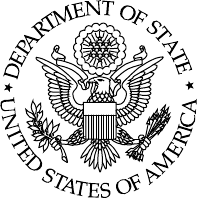
TREATIES AND OTHER INTERNATIONAL ACTS SERIES 07-810
________________________________________________________________________
DEFENSE
Security of Information
Agreement between
the UNITED STATES OF AMERICA
and JAPAN
Signed at Tokyo August 10, 2007
with
Annex
NOTE BY THE DEPARTMENT OF STATE
Pursuant to Public Law 89—497, approved July 8, 1966
(80 Stat. 271; 1 U.S.C. 113)—
“. . .the Treaties and Other International Acts Series issued
under the authority of the Secretary of State shall be competent
evidence . . . of the treaties, international agreements other than
treaties, and proclamations by the President of such treaties and
international agreements other than treaties, as the case may be,
therein contained, in all the courts of law and equity and of maritime
jurisdiction, and in all the tribunals and public offices of the
United States, and of the several States, without any further proof
or authentication thereof.”
JAPAN
Defense: Security of Information
Agreement signed at Tokyo August 10, 2007;
Entered into force August 10, 2007.
With annex.
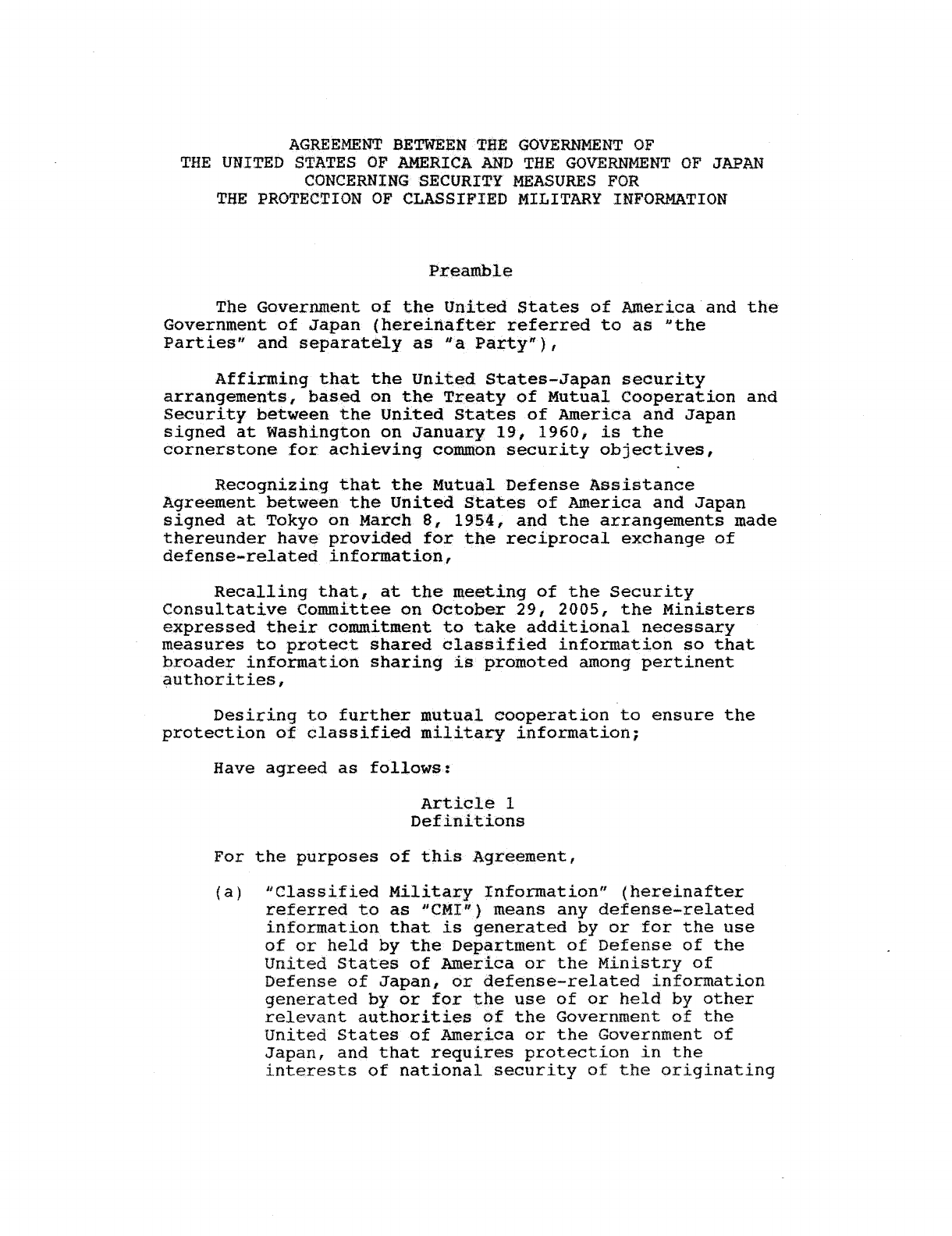
AGREEMENT
BETWEEN
THE
GOVERNMENT
OF
THE
UNITED
STATES
OF
AMERICA
AND
THE
GOVERNMENT
OF
JAPAN
CONCERNING
SECURITY
MEASURES
FOR
THE
PROTECTION
OF
CLASSIFIED
MILITARY
INFORMATION
Preamble
The Government
of
the
United
States
of
America
and
the
Government
of
Japan
(hereinafter
referred
to
as
nthe
Parties"
and
separately
as
'
1
a
Party"),
Affirming
that
the
united
States-Japan
security
arrangements,
based
on
the
Treaty
of
Mutual
Cooperation
and
Security
between
the
united
States
of
America
and
Japan
signed
at
Washington
on
January
19,
1960,
is
the
cornerstone
for
achieving
common
security
objectives,
Recognizing
that
the
Mutual
Defense
Assistance
Agreement
between
the
United
States
of
America
and
Japan
signed
at
Tokyo
on
March
8,
1954,
and
the
arrangements
made
thereunder
have
provided
for
the
reciprocal
exchange
of
defense-related
information,
Recalling
that,
at
the
meeting
of
the
Security
Consultative
Committee
on
October
29,
2005,
the
Ministers
expressed
their
commitment
to
take
additional
necessary
measures
to
protect
shared
classified
information
so
that
broader
information
sharing
is
promoted
among
pertinent
authorities,
Desiring
to
further
mutual
cooperation
to
ensure
the
protection
of
classified
military
information;
Have
agreed
as
follows:
Article
1
Definitions
For
the
purposes
of
this
Agreement,
(a)
"Classified
Military
Information"
(hereinafter
referred
to
as
"CMI") means
any
defense-related
information
that
is
generated
by
or
for
the
use
of
or
held
by
the
Department
of
Defense
of
the
United
states
of
America
or
the
Ministry
of
Defense
of
Japan,
or
defense-related
information
generated
by
or
for
the
use
of
or
held
by
other
relevant
authorities
of
the
Government
of
the
United
States
of
America
or
the
Government
of
Japan,
and
that
requires
protection
in
the
interests
of
national
security
of
the
originating
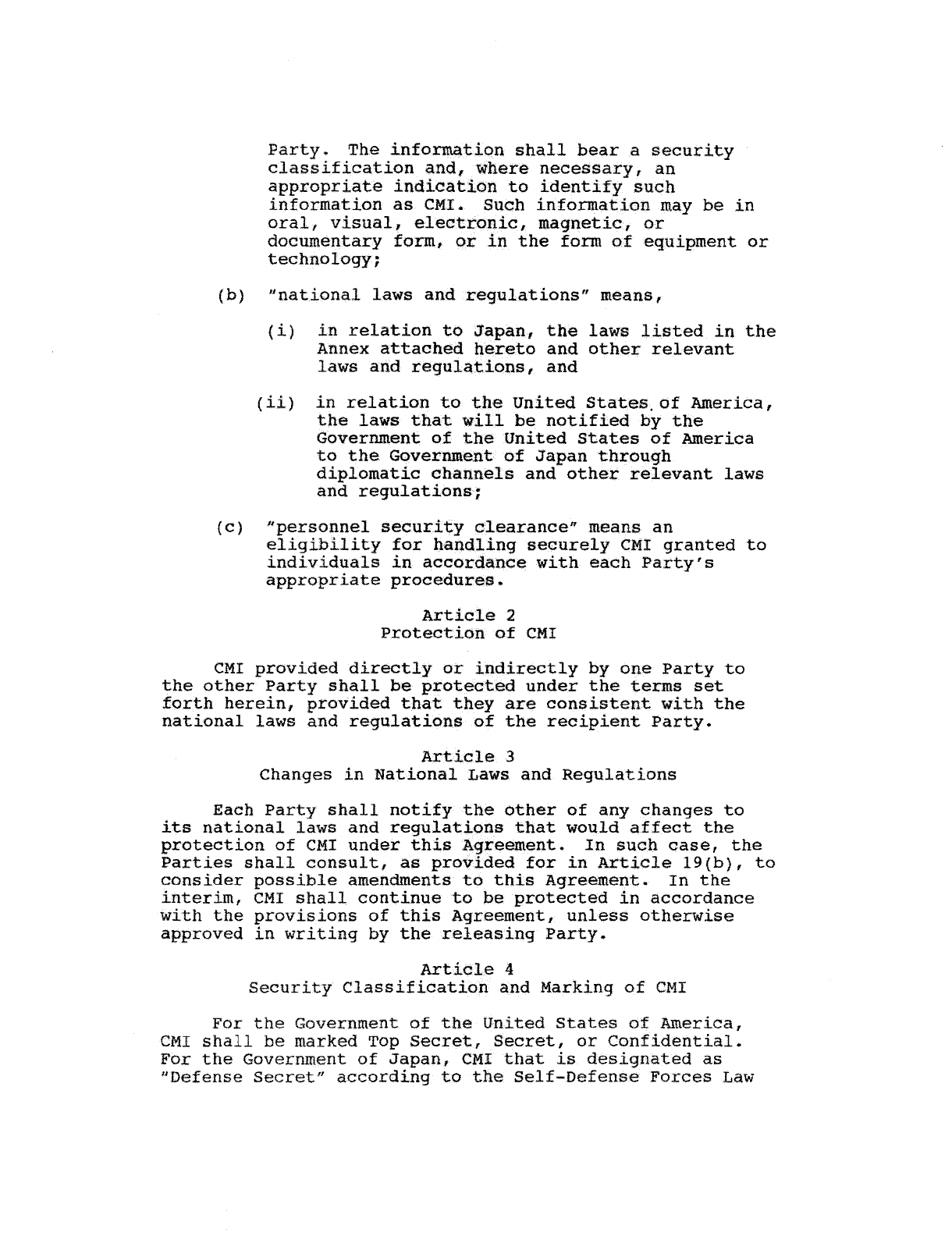
Party.
The
information
shall
bear
a
security
classification
and,
where
necessary,
an
appropriate
indication
to
identify
such
information
as
CMI.
Such
information
may
be
in
oral,
visual,
electronic,
magnetic,
or
documentary
form,
or
in
the
form
of
equipment
or
technology;
(b)
"national
laws
and
regulations"
means,
(i)
in
relation
to
Japan,
the
laws
listed
in
the
Annex
attached
hereto
and
other
relevant
laws
and
regulations,
and
(ii)
in
relation
to
the
United
States.of
America,
the
laws
that
will
be
notified
by
the
Government
of
the
United
States
of
America
to
the
Government
of
Japan
through
diplomatic
channels
and
other
relevant
laws
and
regulations;
(c)
$'personnel
security
clearance"
means
an
eligibility
for
handling
securely
CMI
granted
to
individuals
in
accordance
with
each
Party's
appropriate
procedures.
Article
2
Protection
of
CMI
CMI
provided
directly
or
indirectly
by
one
Party
to
the
other
Party
shall
be
protected
under
the
terms
set
forth
herein,
provided
that
they
are
consistent
with
the
national
laws
and
regulations
of
the
recipient
Party.
Article
3
Changes
in
National
Laws
and
Regulations
Each
Party
shall
notify
the
other
of
any
changes
to
its
national
laws
and
regulations
that
would
affect
the
protection
of
CMI
under
this
Agreement.
In
such
case,
the
Parties
shall
consult,
as
provided
for
in
Article
19{b),
to
consider
possible
amendments
to
this
Agreement.
In
the
interim,
CMI
shall
continue
to
be
protected
in
accordance
with
the
provisions
of
this
Agreement,
unless
otherwise
approved
in
writing
by
the
releasing
Party.
Article
4
Security
Classification
and
Marking
of
CMI
For
the
Government
of
the
United
States
of
America,
CMI
shall
be
marked
Top
Secret,
Secret,
or
Confidential.
For
the
Government
of
Japan,
CMI
that
is
designated
as
"Defense
Secret!!
according
to
the
Self-Defense
Forces
Law
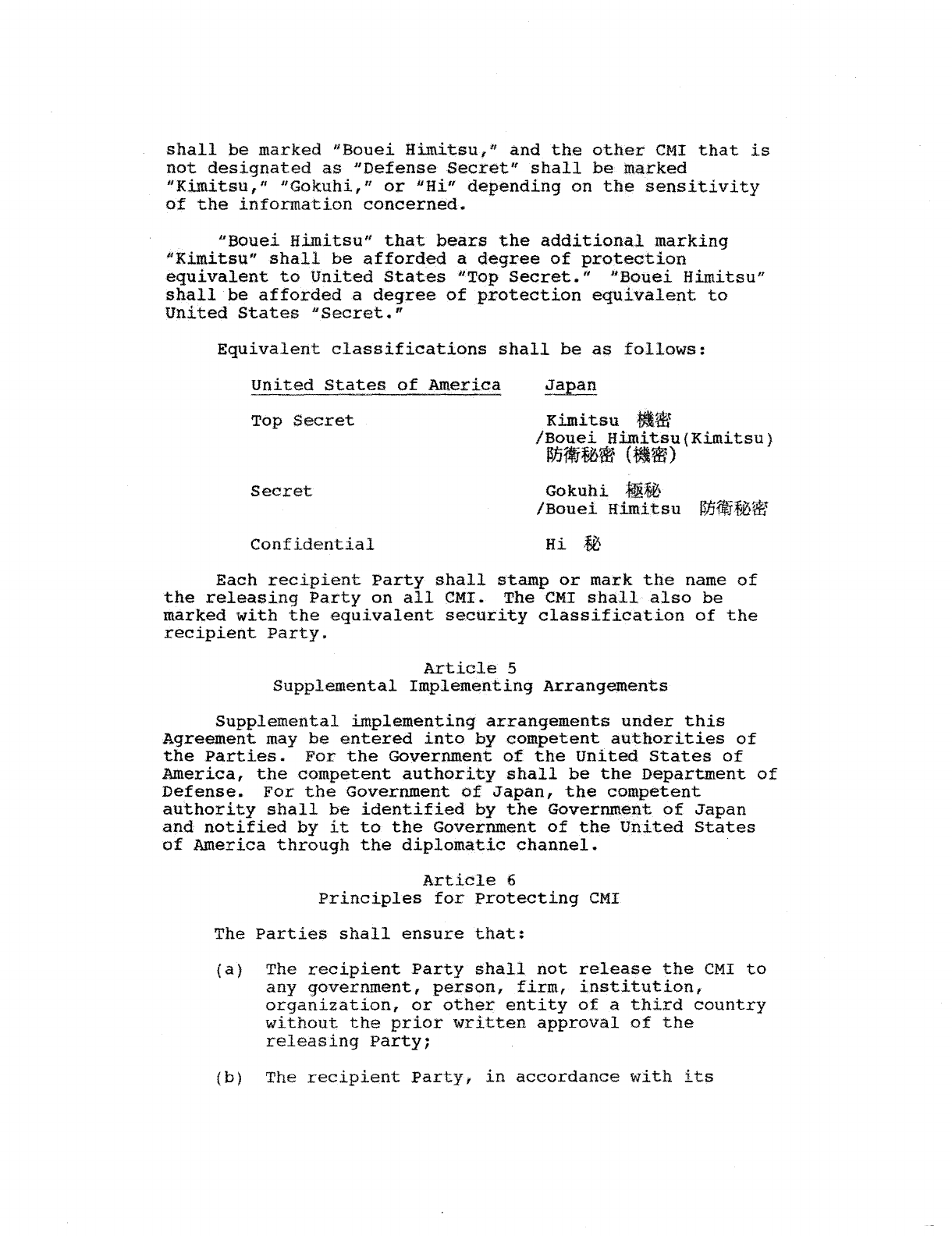
shall
be
marked
11
Bouei
Himitsu,
,,
and
the
other
CMI
that
is
not
designated
as
noefense
secret"
shall
be
marked
"Kimitsu,"
11
Gokuhi,"
or
nHi"
depending
on
the
sensitivity
of
the
information
concerned.
"Bouei
Himitsu"
that
bears
the
additional
marking
"Kimitsu"
shall
be
afforded
a
degree
of
protection
equivalent
to
United
States
11
TOp
Secret."
"Bouei
Himitsu"
shall
be
afforded
a
degree
of
protection
equivalent
to
United
States
11
Secret."
Equivalent
classifications
shall
be
as
follows:
United
States
of
America
~a
pan
Top
Secret
Kimi
tsu
~!&t
/Bouei
Himitsu(Kimitsu)
f5JJ1t~W
(tt~m)
Secret
Gokuhi
-~
/Bouei
Himitsu
f5Jj~.¥~m
Confidential
Hi
.fl}
Each
recipient
Party
shall
stamp
or
mark
the
name
of
the
releasing
Party
on
all
CMI.
The
CMI
shall
also
be
marked
with
the
equivalent
security
classification
of
the
recipient
Party.
Article
5
Supplemental
Implementing
Arrangements
Supplemental
implementing
arrangements
under
this
Agreement
may
be
entered
into
by
competent
authorities
of
the
Parties.
For
the
Government
of
the
united
States
of
America,
the
competent
authority
shall
be
the
Department
of
Defense.
For
the
Government
of
Japan,
the
competent
authority
shall
be
identified
by
the
Government
of
Japan
and
notified
by
it
to
the
Government
of
the
United
States
of
America
through
the
diplomatic
channel.
Article
6
Principles
for
Protecting
CMI
The
Parties
shall
ensure
that:
(a)
The
recipient
Party
shall
not
release
the
CMI
to
any
government,
person,
firm,
institution,
organization,
or
other
entity
of
a
third
country
without
the
prior
written
approval
of
the
releasing
Party;
(b)
The
recipient
Party,
in
accordance
with
its
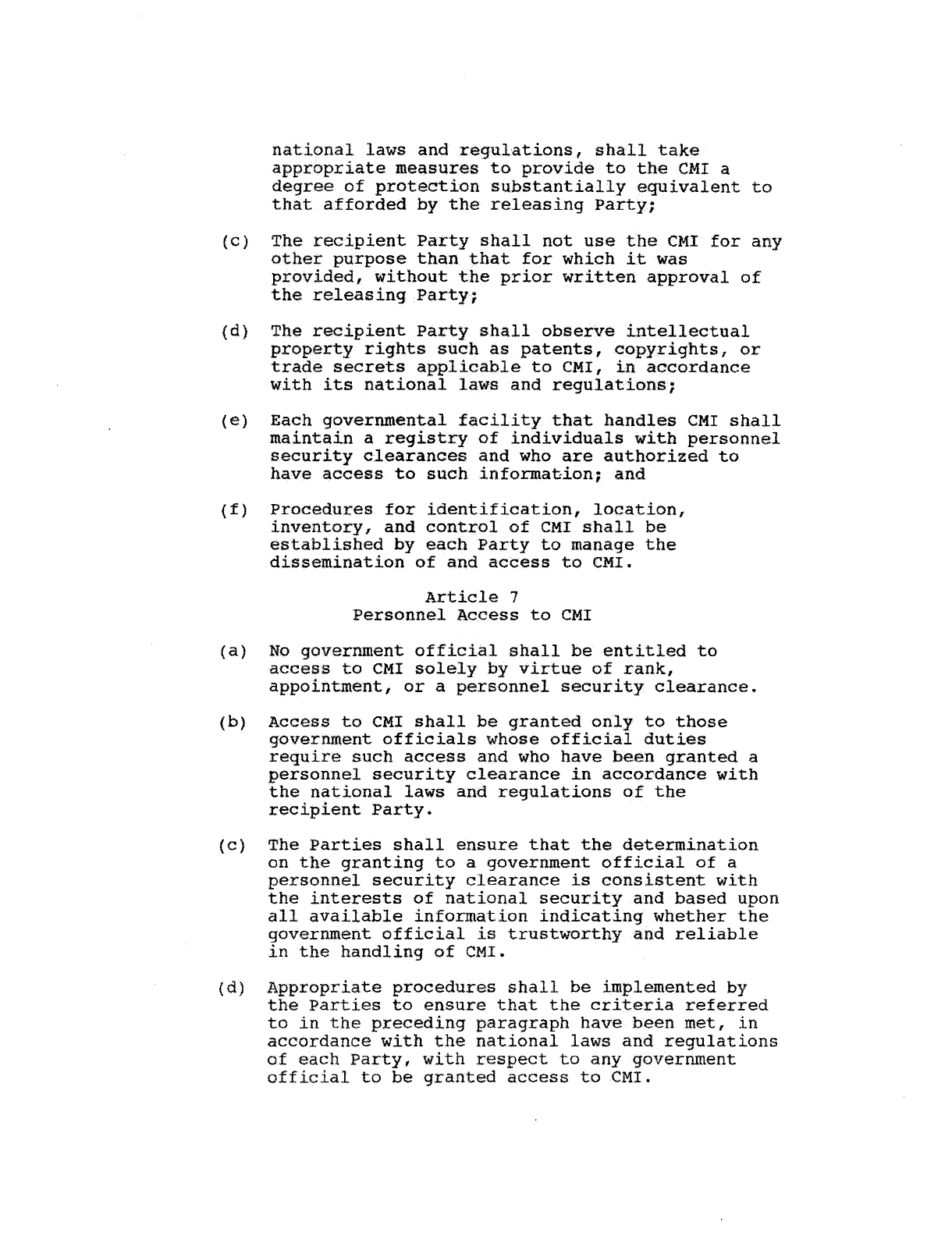
national
laws
and
regulations,
shall
take
appropriate
measures
to
provide
to
the
CMI
a
degree
of
protection
substantially
equivalent
to
that
afforded
by
the
releasing
Party;
{c) The
recipient
Party
shall
not
use
the
CMI
for
any
other
purpose
than
that
for
which
it
was
provided,
without
the
prior
written
approval
of
the
releasing
Party;
(d)
The
recipient
Party
shall
observe
intellectual
property
rights
such
as
patents,
copyrights,
or
trade
secrets
applicable
to
CMI,
in
accordance
with
its
national
laws
and
regulations;
(e)
Each
governmental
facility
that
handles
CMI
shall
maintain
a
registry
of
individuals
with
personnel
security
clearances
and
who
are
authorized
to
have
access
to
such
informa~ion;
and
(f)
Procedures
for
identification,
location,
inventory,
and
control
of
CMI
shall
be
established
by
each
Party
to
manage
the
dissemination
of
and
access
to
CMI.
Article
7
Personnel
Access
to
CMI
(a)
No
government
official
shall
be
entitled
to
access
to
CMI
solely
by
virtue
of
rank,
appointment,
or
a
personnel
security
clearance.
(b)
Access
to
CMI
shall
be
granted
only
to
those
government
officials
whose
official
duties
require
such
access
and
who
have
been
granted
a
personnel
security
clearance
in
accordance
with
the
national
laws
and
regulations
of
the
recipient
Party.
(c)
The
Parties
shall
ensure
that
the
determination
on
the
granting
to
a
government
official
of
a
personnel
security
clearance
is
consistent
with
the
interests
of
national
security
and
based
upon
all
available
information
indicating
whether
the
government
official
is
trustworthy
and
reliable
in
the
handling
of
CMI.
(d)
Appropriate
procedures
shall
be
implemented
by
the
Parties
to
ensure
that
the
criteria
referred
to
in
the
preceding
paragraph
have
been
met,
in
accordance
with
the
national
laws
and
regulations
of
each
Party,
with
respect
to
any
government
official
to
be
granted
access
to
CMI.
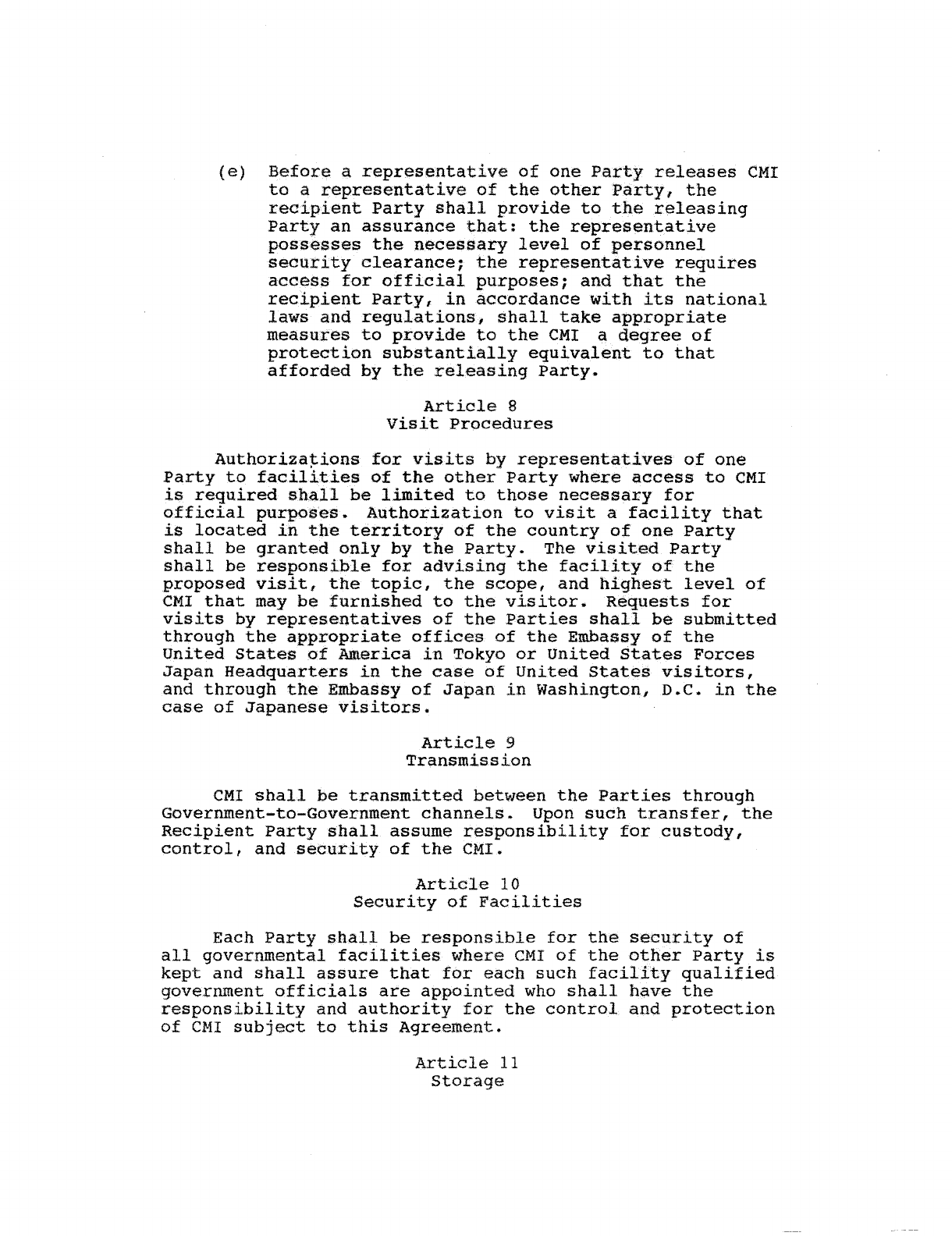
(e)
Before
a
representative
of
one
Party
releases
CMI
to
a
representative
of
the
other
Party,
the
recipient
Party
shall
provide
to
the
releasing
Party
an
assurance
that:
the
representative
possesses
the
necessary
level
of
personnel
security
clearance;
the
representative
requires
access
for
official
purposes;
and
that
the
recipient
Party,
in
accordance
with
its
national
laws
and
regulations,
shall
take
appropriate
measures
to
provide
to
the
CMI
a
degree
of
protection
substantially
equivalent
to
that
afforded
by
the
releasing
Party.
Article
8
Visit
Procedures
Authorizations
for
visits
by
representatives
of
one
Party
to
facilities
of
the
other
Party
where
access
to
CMI
is
required
shall
be
limited
to
those
necessary
for
official
purposes.
Authorization
to
visit
a
facility
that
is
located
in
the
territory
of
the
country
of
one
Party
shall
be
granted
only
by
the
Party.
The
visited
Party
shall
be
responsible
for
advising
the
facility
of
the
proposed
visit,
the
topic,
the
scope,
and
highest
level
of
CMI
that
may
be
furnished
to
the
visitor.
Requests
for
visits
by
representatives
of
the
Parties
shall
be
submitted
through
the
appropriate
offices
of
the
Embassy
of
the
united
States
of
America
in
Tokyo
or
United
states
Forces
Japan
Headquarters
in
the
case
of
United
States
visitors,
and
through
the
Embassy
of
Japan
in
Washington,
D.C.
in
the
case
of
Japanese
visitors.
Article
9
Transmission
CMI
shall
be
transmitted
between
the
Parties
through
Government-to-Government
channels.
Upon
such
transfer,
the
Recipient
Party
shall
assume
responsibility
for
custody,
control,
and
security
of
the
CMI.
Article
10
Security
of
Facilities
Each
Party
shall
be
responsible
for
the
security
of
all
governmental
facilities
where
CMI
of
the
other
Party
is
kept
and
shall
assure
that
for
each
such
facility
qualified
government
officials
are
appointed
who
shall
have
the
responsibility
and
authority
for
the
control
and
protection
of
CMI
subject
to
this
Agreement.
Article
11
Storage
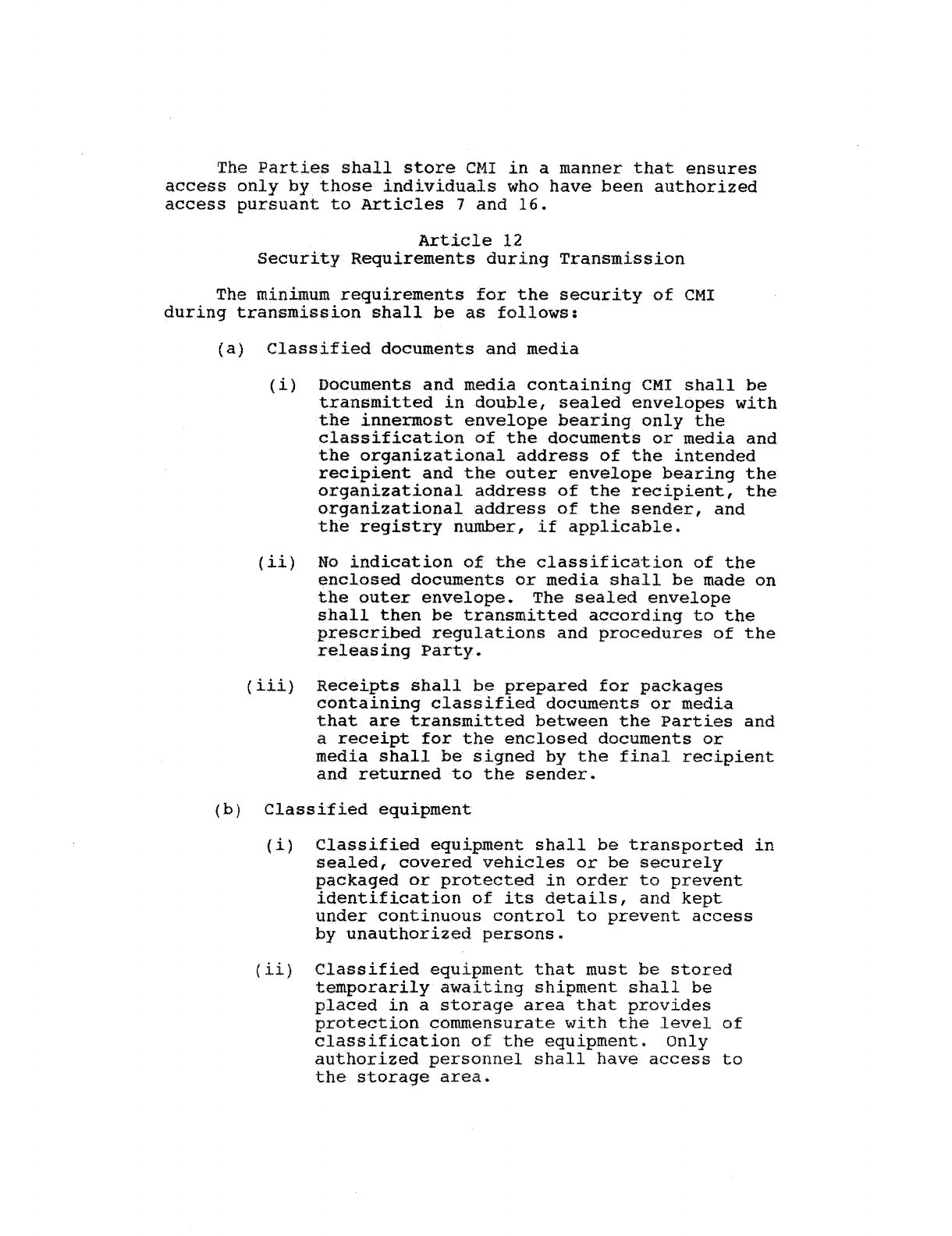
The
Parties
shall
store
CMI
in
a
manner
that
ensures
access
only
by
those
individuals
who
have
been
authorized
access
pursuant
to
Articles
7
and
16.
Article
12
Security
Requirements
during
Transmission
The minimum
requirements
for
the
security
of
CMI
during
transmission
shall
be
as
follows:
(a)
Classified
documents
and
media
(i)
Documents
and
media
containing
CMI
shall
be
transmitted
in
double,
sealed
envelopes
with
the
innermost
envelope
bearing
only
the
classification
of
the
documents
or
media
and
the
organizational
address
of
the
intended
recipient
and
the
outer
envelope
bearing
the
organizational
address
of
the
recipient,
the
organizational
address
of
the
sender,
and
the
registry
number,
if
applicable.
(ii)
No
indication
of
the
classification
of
the
enclosed
documents
or
media
shall
be
made
on
the
outer
envelope.
The
sealed
envelope
shall
then
be
transmitted
according
to
the
prescribed
regulations
and
procedures
of
the
releasing
Party.
(iii}
Receipts
shall
be
prepared
for
packages
containing
classified
documents
or
media
that
are
transmitted
between
the
Parties
and
a
receipt
for
the
enclosed
documents
or
media
shall
be
signed
by
the
final
recipient
and
returned
to
the
sender.
(b)
Classified
equipment
(i)
Classified
equipment
shall
be
transported
in
sealed,
covered
vehicles
or
be
securely
packaged
or
protected
in
order
to
prevent
identification
of
its
details,
and
kept
under
continuous
control
to
prevent
access
by
unauthorized
persons.
(ii)
Classified
equipment
that
must
be
stored
temporarily
awaiting
shipment
shall
be
placed
in
a
storage
area
that
provides
protection
commensurate
with
the
level
of
classification
of
the
equipment.
Only
authorized
personnel
shall
have
access
to
the
storage
area.

(iii)
Receipts
shall
be
obtained
on
every
occasion
when
classified
equipment
changes
hands
en
route.
(iv)
Receipts
shall
be
signed
by
the
final
recipient
and
returned
to
the
sender.
(c)
Electronic
transmissions
CMI
transmitted
by
electronic
means
shall
be
protected
during
transmission
using
encryption
appropriate
for
that
level
of
classified
information.
Information
systems
processing,
storing,
or
conveying
CMI
shall
receive
security
accreditation
by
the
appropriate
authority
of
the
Party
employing
the
system.
Article
13
Destruction
(a)
The
Parties
shall
destroy
classified
documents
and
media
by
burning,
shredding,
pulping,
or
other
means
preventing
reconstruction
in
whole
or
in
part
of
the
CMI.
(b)
The
Parties
shall
destroy
classified
equipment
beyond
recognition
or
modify
it
so
as
to
preclude
reconstruction
in
whole
or
in
part
of
the
CMI.
Article
14
Reproduction
When
the
Parties
reproduce
classified
documents
or
media,
they
shall
also
reproduce
all
original
security
markings
thereon
or
mark
on
each
copy.
The
Parties
shall
place
such
reproduced
classified
documents
or
media
under
the
same
controls
as
the
original
classified
documents
or
media.
The
Parties
shall
limit
the
number
of
copies
to
that
required
for
official
purposes.
Article
15
Translations
The
Parties
shall
ensure
that
all
translations
of
CMI
are
done
by
individuals
with
personnel
security
clearances
pursuant
to
Articles
7
and
16.
The
Parties
shall
keep
the
number
of
copies
to
a minimum
and
control
the
distribution.
Such
translations
shall
bear
appropriate
security
classification
markings
and
a
suitable
notation
in
the
language
into
which
it
is
translated
indicating
that
the
document
or
media
contains
CMI
of
the
releasing
Party.
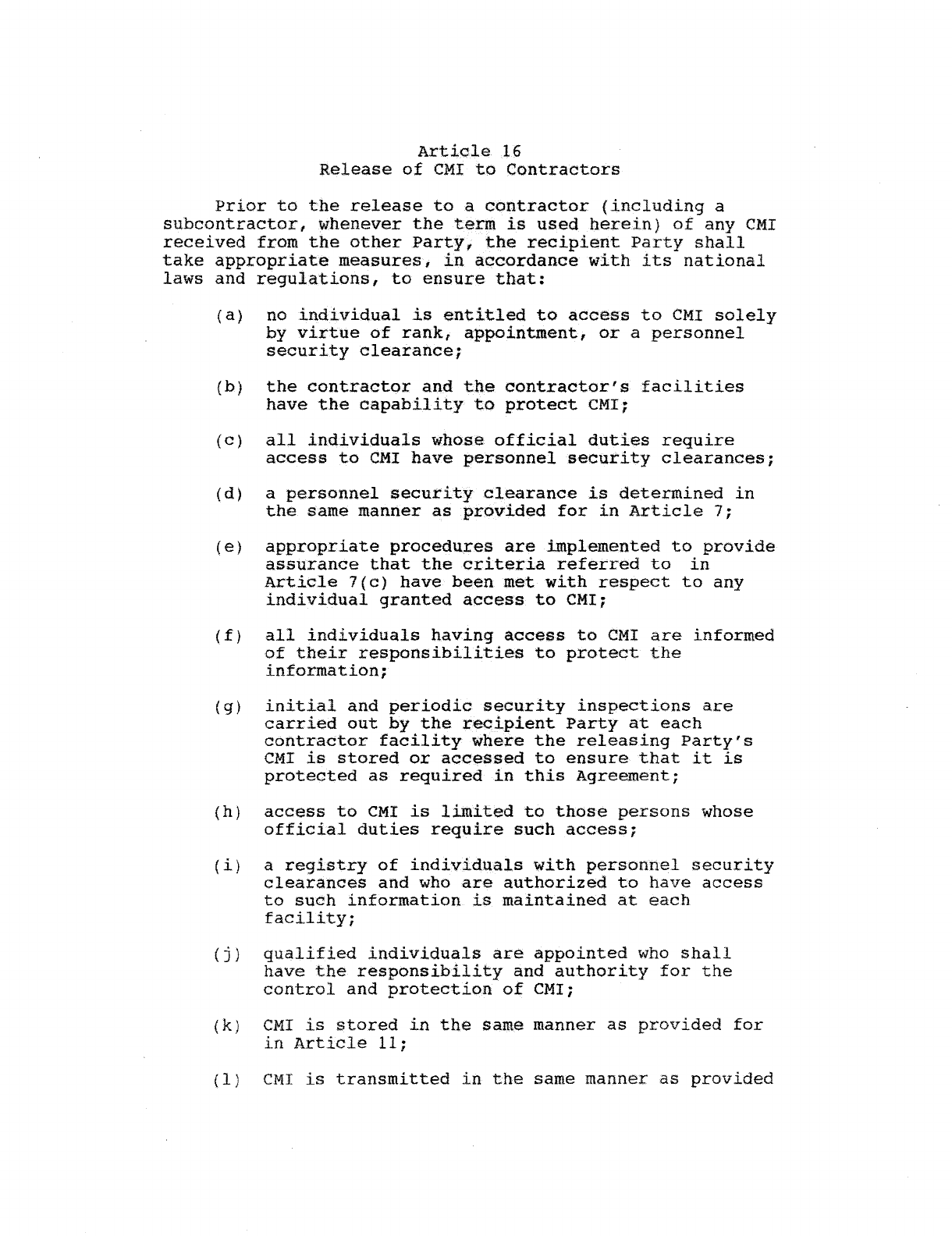
Article
16
Release
of
CMI
to
Contractors
Prior
to
the
release
to
a
contractor
(including
a
subcontractor,
whenever
the
term
is
used
herein)
of
any
CMI
received
from
the
other
Party,
the
recipient
Party
shall
take
appropriate
measures,
in
accordance
with
its
national
laws
and
regulations,
to
ensure
that:
(a)
no
individual
is
entitled
to
access
to
CMI
solely
by
virtue
of
rank,
appointment,
or
a
personnel
security
clearance;
(b)
the
contractor
and
the
contractor's
facilities
have
the
capability
to
protect
CMI;
{c)
all
individuals
whose
official
duties
require
access
to
CMI
have
personnel
security
clearances;
(d)
a
personnel
security
clearance
is
determined
in
the
same
manner
as
provided
for
in
Article
7;
(e)
appropriate
procedures
are
implemented
to
provide
assurance
that
the
criteria
referred
to
in
Article
7(c)
have
been
met
with
respect
to
any
individual
granted
access
to
CMI;
(f)
all
individuals
having
access
to
CMI
are
informed
of
their
responsibilities
to
protect
the
information;
(g)
initial
and
periodic
security
inspections
are
carried
out
by
the
recipient
Party
at
each
contractor
facility
where
the
releasing
Party's
CMI
is
stored
or
accessed
to
ensure
that
it
is
protected
as
required
in
this
Agreement;
(h)
access
to
CMI
is
limited
to
those
persons
whose
official
duties
require
such
access;
(i)
a
registry
of
individuals
with
personnel
security
clearances
and
who
are
authorized
to
have
access
to
such
information
is
maintained
at
each
facility;
(j)
qualified
individuals
are
appointed
who
shall
have
the
responsibility
and
authority
for
the
control
and
protection
of
CMI;
{k)
CMI
is
stored
in
the
same manner
as
provided
for
in
Article
11;
{1)
CMI
is
transmitted
in
the
same manner
as
provided
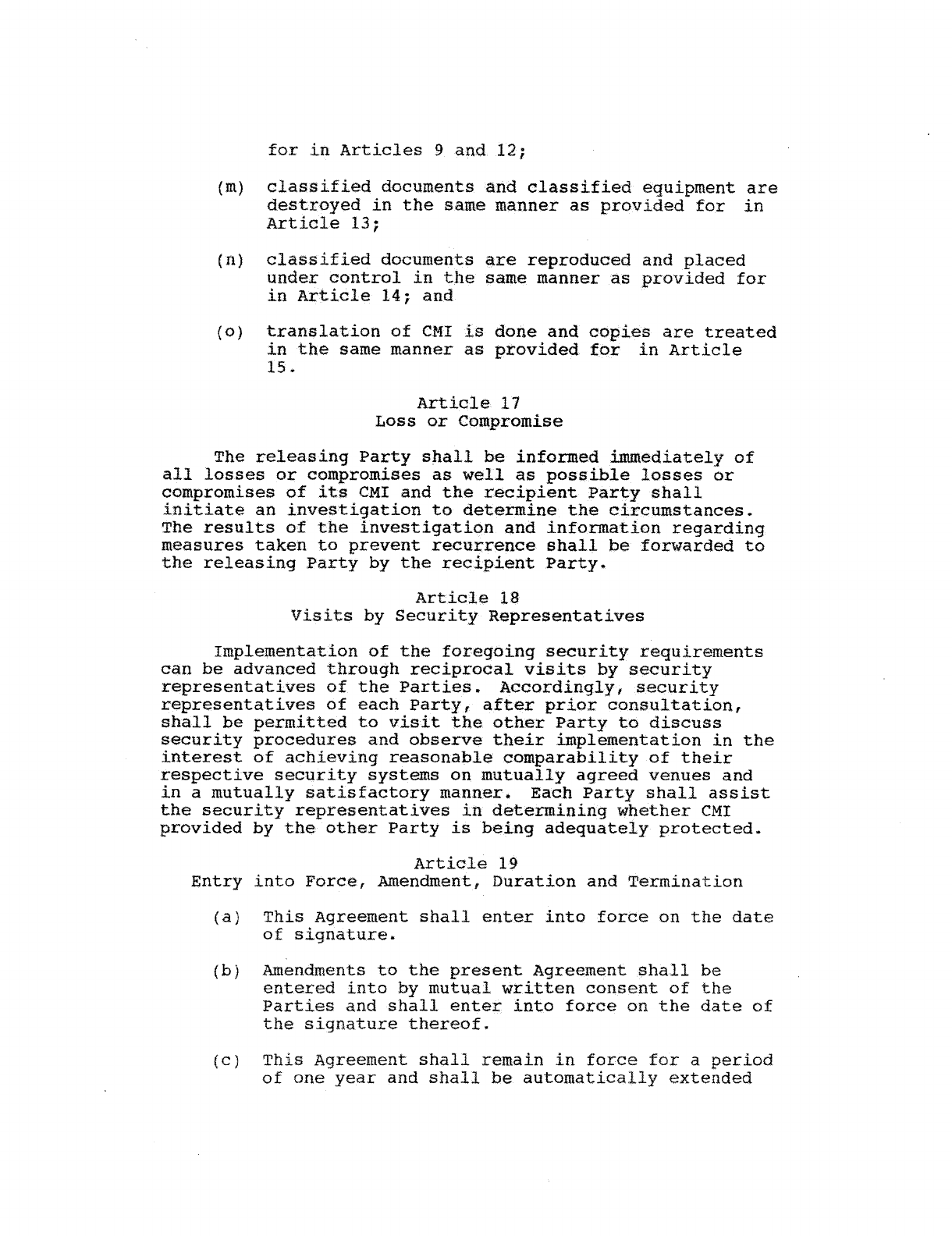
for
in
Articles
9
and
12;
{m)
classified
documents
and
classified
equipment
are
destroyed
in
the
same
manner
as
provided
for
in
Article
13;
(n)
classified
documents
are
reproduced
and
placed
under
control
in
the
same
manner
as
provided
for
in
Article
14;
and
(o)
translation
of
CMI
is
done
and
copies
are
treated
in
the
same manner
as
provided
for
in
Article
15.
Article
17
Loss
or
Compromise
The
releasing
Party
shall
be
informed
immediately
of
all
losses
or
compromises
as
well
as
possible
losses
or
compromises
of
its
CMI
and
the
recipient
Party
shall
initiate
an
investigation
to
determine
the
circumstances.
The
results
of
the
investigation
and
information
regarding
measures
taken
to
prevent
recurrence
shall
be
forwarded
to
the
releasing
Party
by
the
recipient
Party.
Article
18
Visits
by
Security
Representatives
Implementation
of
the
foregoing
security
requirements
can
be
advanced
through
reciprocal
visits
by
security
representatives
of
the
Parties.
Accordingly,
security
representatives
of
each
Party,
after
prior
consultation,
shall
be
permitted
to
visit
the
other
Party
to
discuss
security
procedures
and
observe
their
implementation
in
the
interest
of
achieving
reasonable
comparability
of
their
respective
security
systems
on
mutually
agreed
venues
and
in
a
mutually
satisfactory
manner.
Each
Party
shall
assist
the
security
representatives
in
determining
whether
CMI
provided
by
the
other
Party
is
being
adequately
protected.
Article
19
Entry
into
Force,
Amendment,
Duration
and
Termination
(a)
This
Agreement
shall
enter
into
force
on
the
date
of
signature.
(bj
Amendments
to
the
present
Agreement
shall
be
entered
into
by
mutual
written
consent
of
the
Parties
and
shall
enter
into
force
on
the
date
of
the
signature
thereof.
(c)
This
Agreement
shall
remain
in
force
for
a
period
of
one
year
and
shall
be
automatically
extended
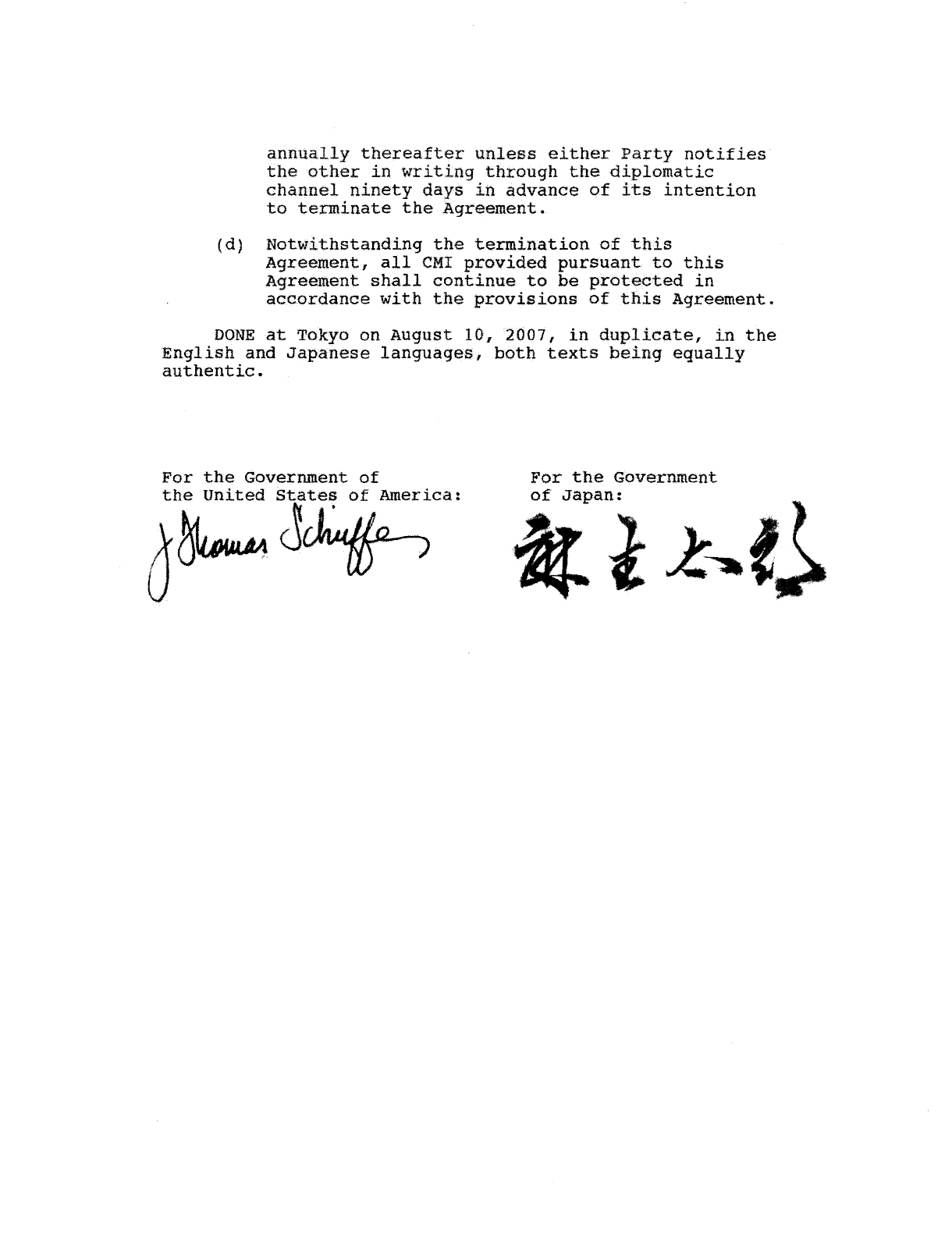
annually
thereafter
unless
either
Party
notifies
the
other
in
writing
through
the
diplomatic
channel
ninety
days
in
advance
of
its
intention
to
terminate
the
Agreement.
(d)
Notwithstanding
the
termination
of
this
Agreement,
all
CMI
provided
pursuant
to
this
Agreement
shall
continue
to
be
protected
in
accordance
with
the
provisions
of
this
Agreement.
DONE
at
Tokyo on August
10,
2007,
in
duplicate,
in
the
English
and
Japanese
languages,
both
texts
being
equally
authentic.
For
the
Government
of
the
United
:Jr:J:~~ca:
6~
~··ID
)
For
the
Government
of
Japan:
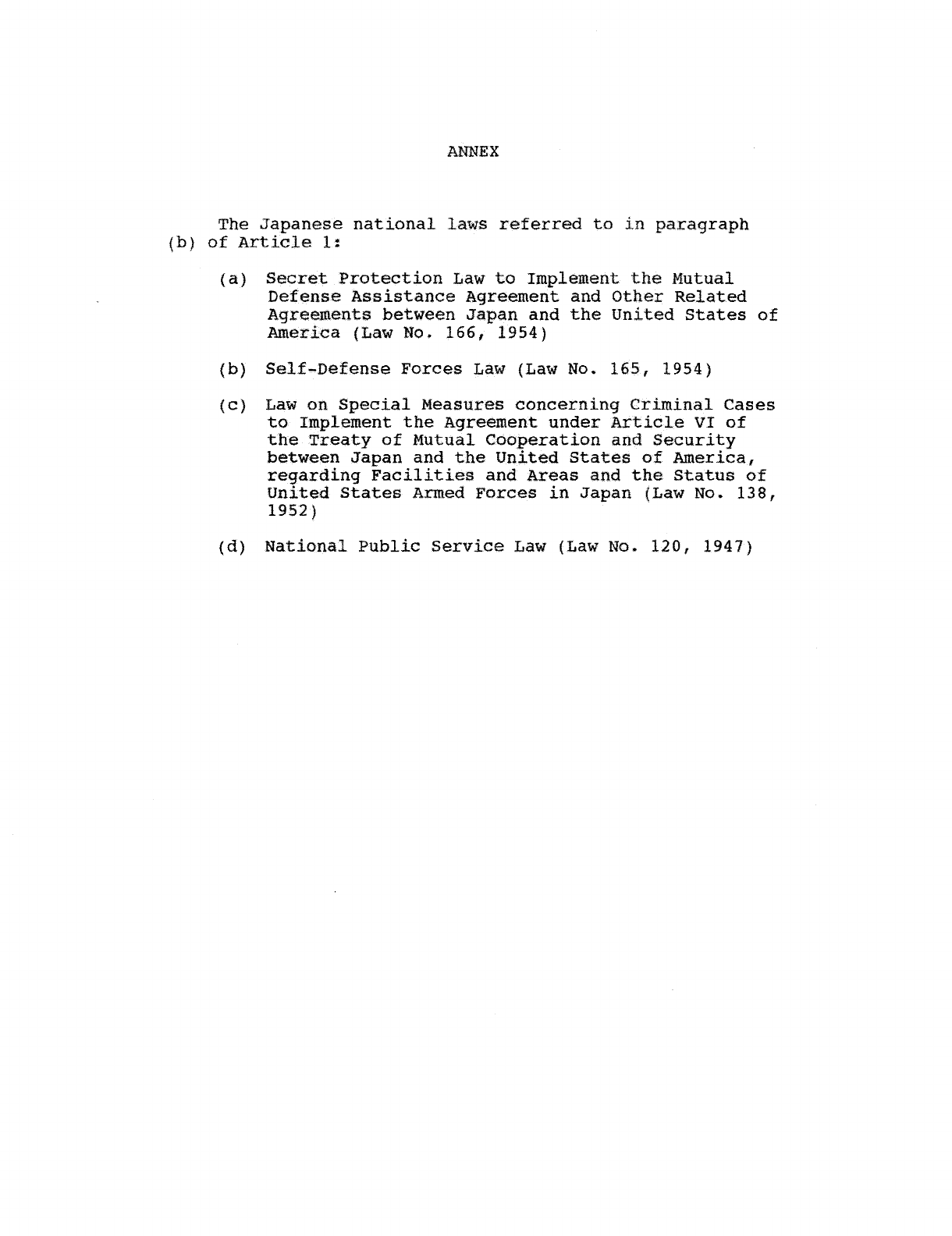
ANNEX
The
Japanese
national
laws
referred
to
in
paragraph
(b)
of
Article
1:
(a)
Secret
Protection
Law
to
Implement
the
Mutual
Defense
Assistance
Agreement
and
Other
Related
Agreements
between
Japan
and
the
united
States
of
America
(Law No.
166,
1954)
(b)
Self-Defense
Forces
Law
(Law No.
165,
1954)
(c)
Law
on
Special
Measures
concerning
Criminal
Cases
to
Implement
the
Agreement
under
Article
VI
of
the
Treaty
of
Mutual
Cooperation
and
Security
between
Japan
and
the
United
States
of
America,
regarding
Facilities
and
Areas
and
the
Status
of
United
States
Armed
Forces
in
Japan
(Law No.
138,
1952)
(d)
National
Public
service
Law
(Law No.
120,
1947)
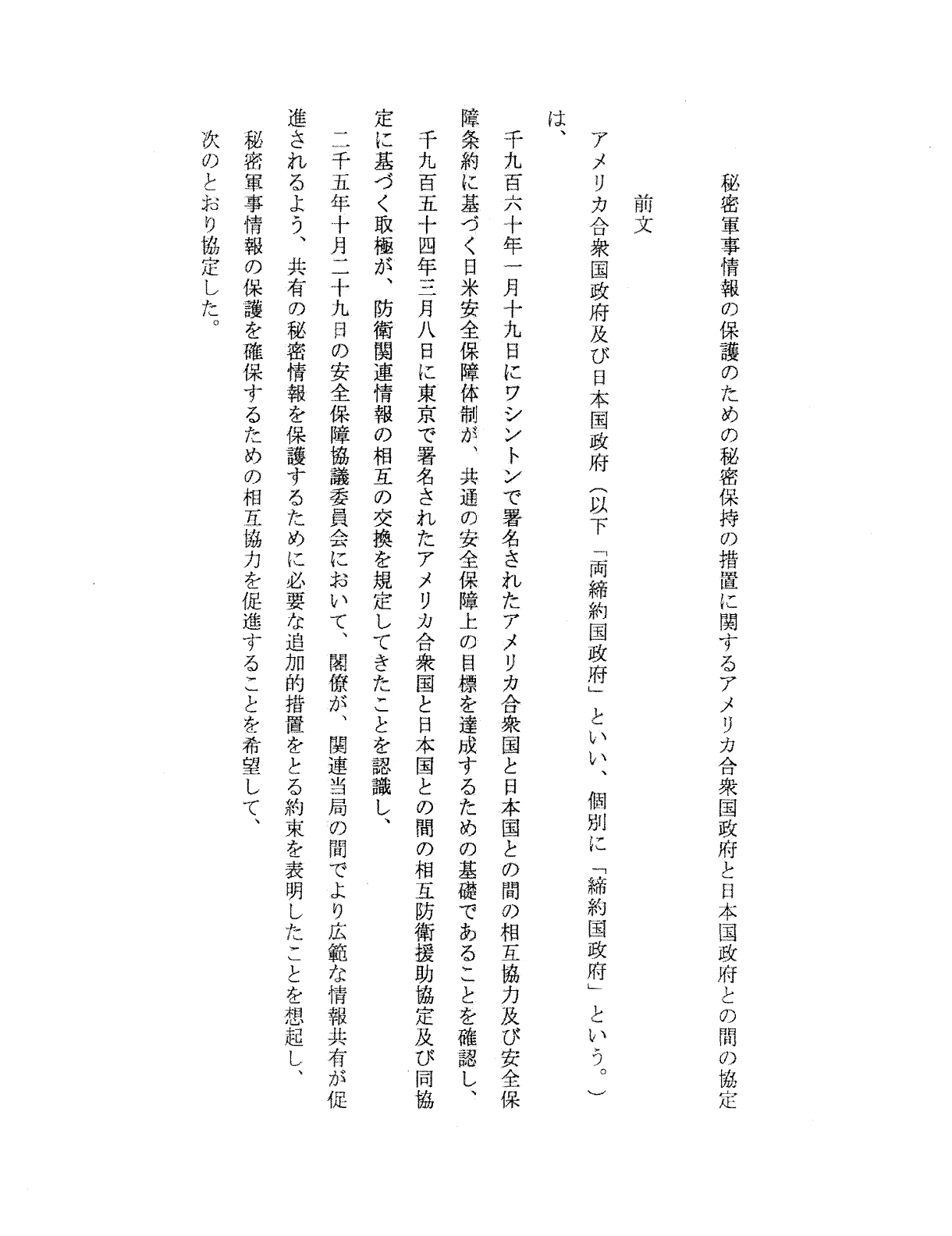
1
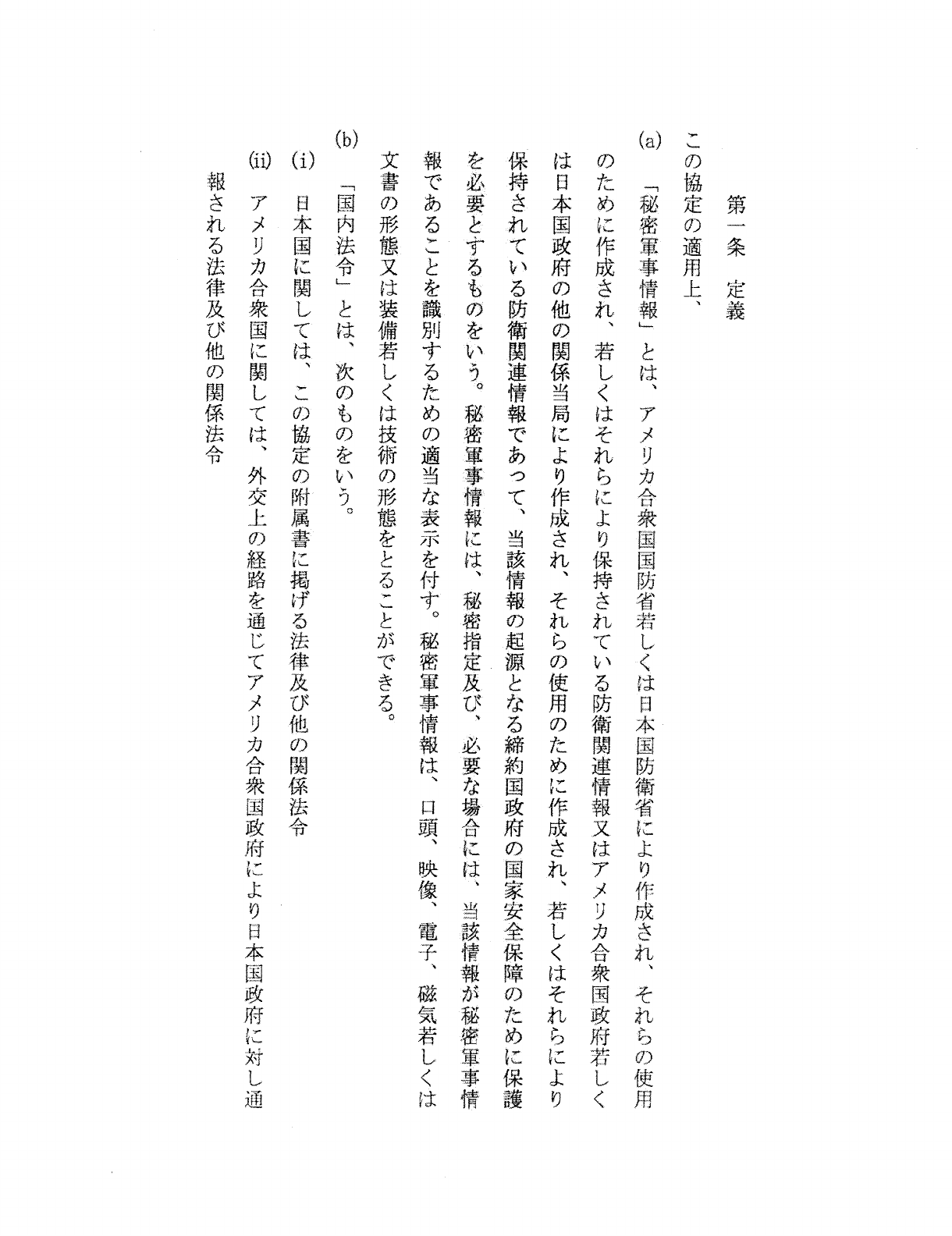
2
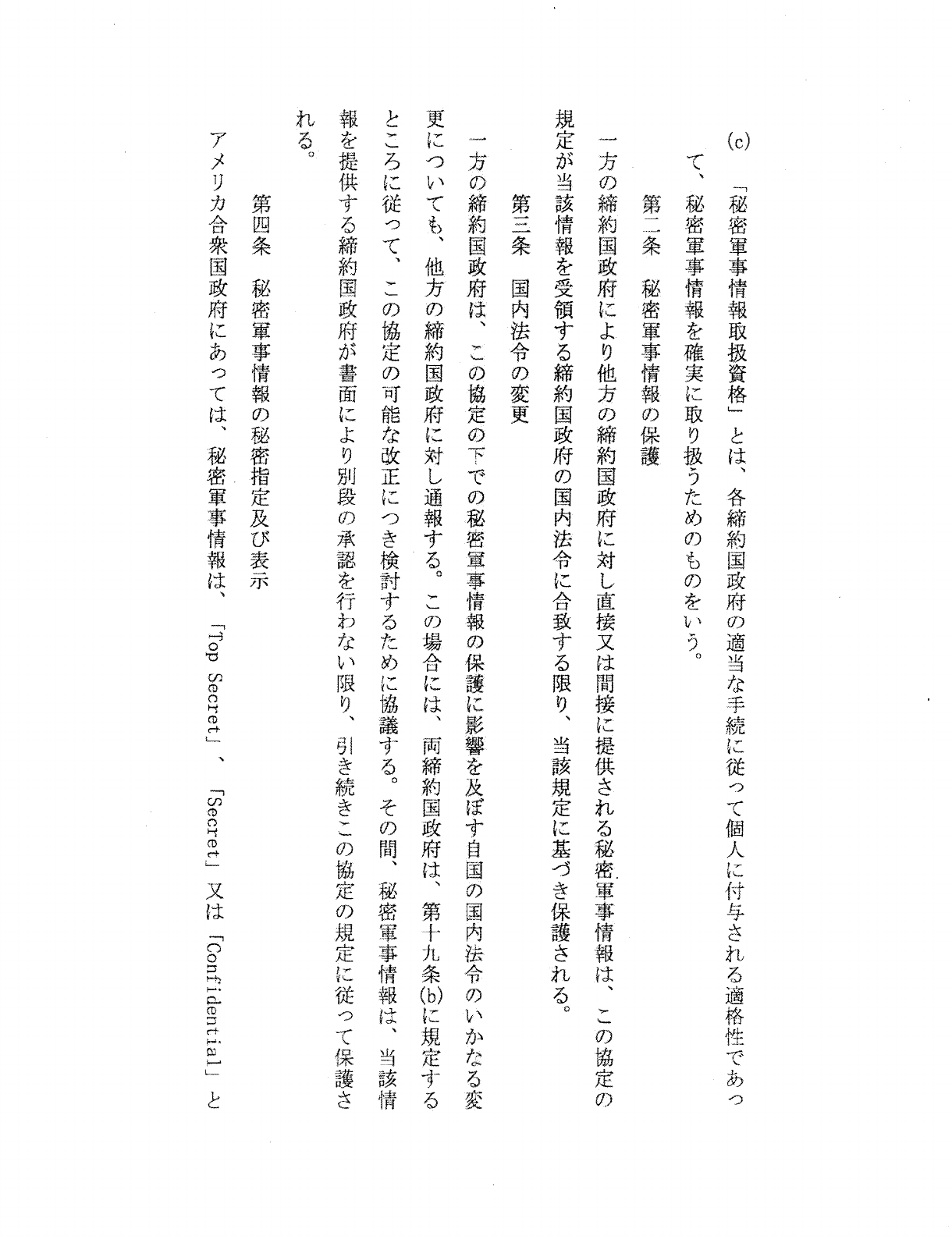
3
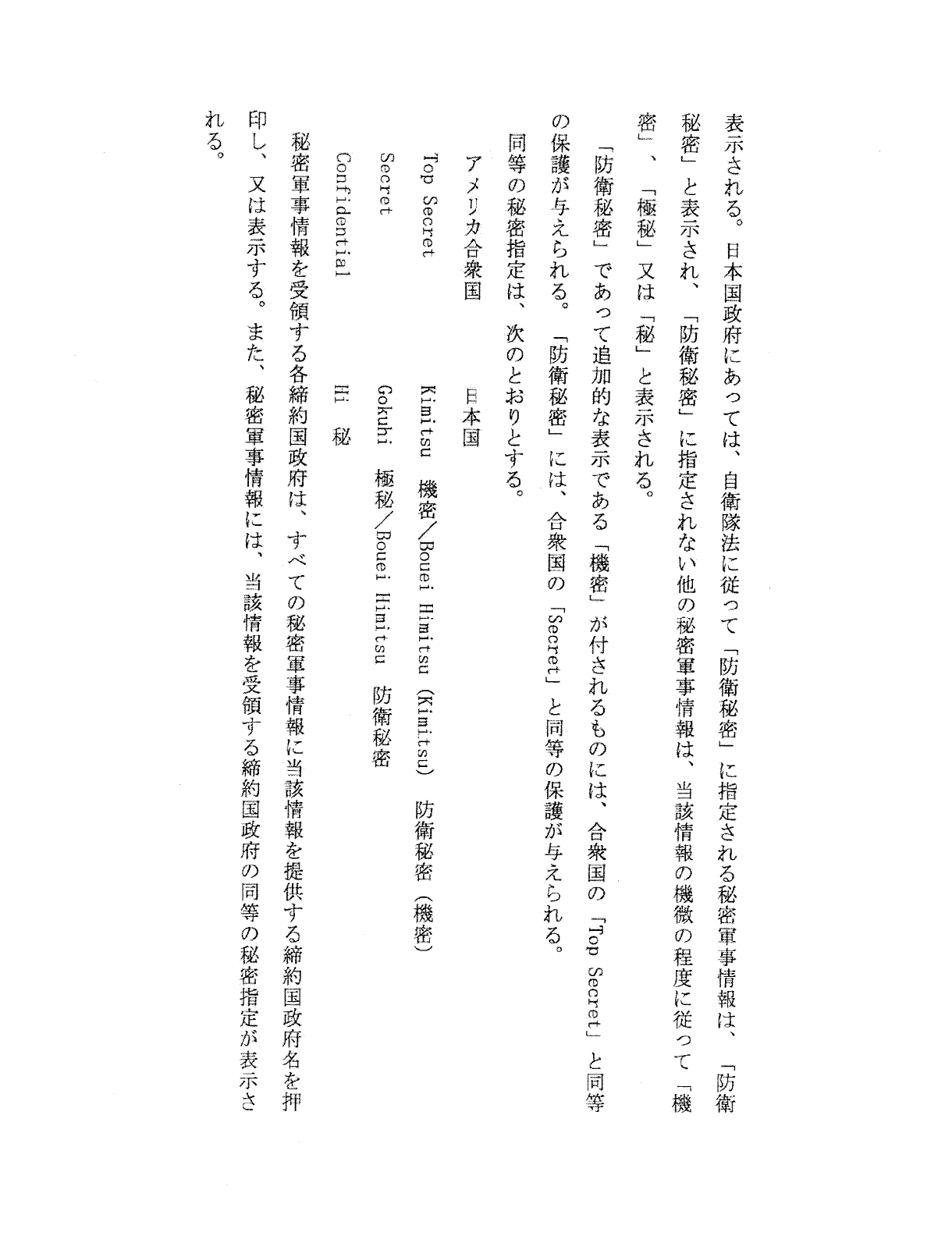
4
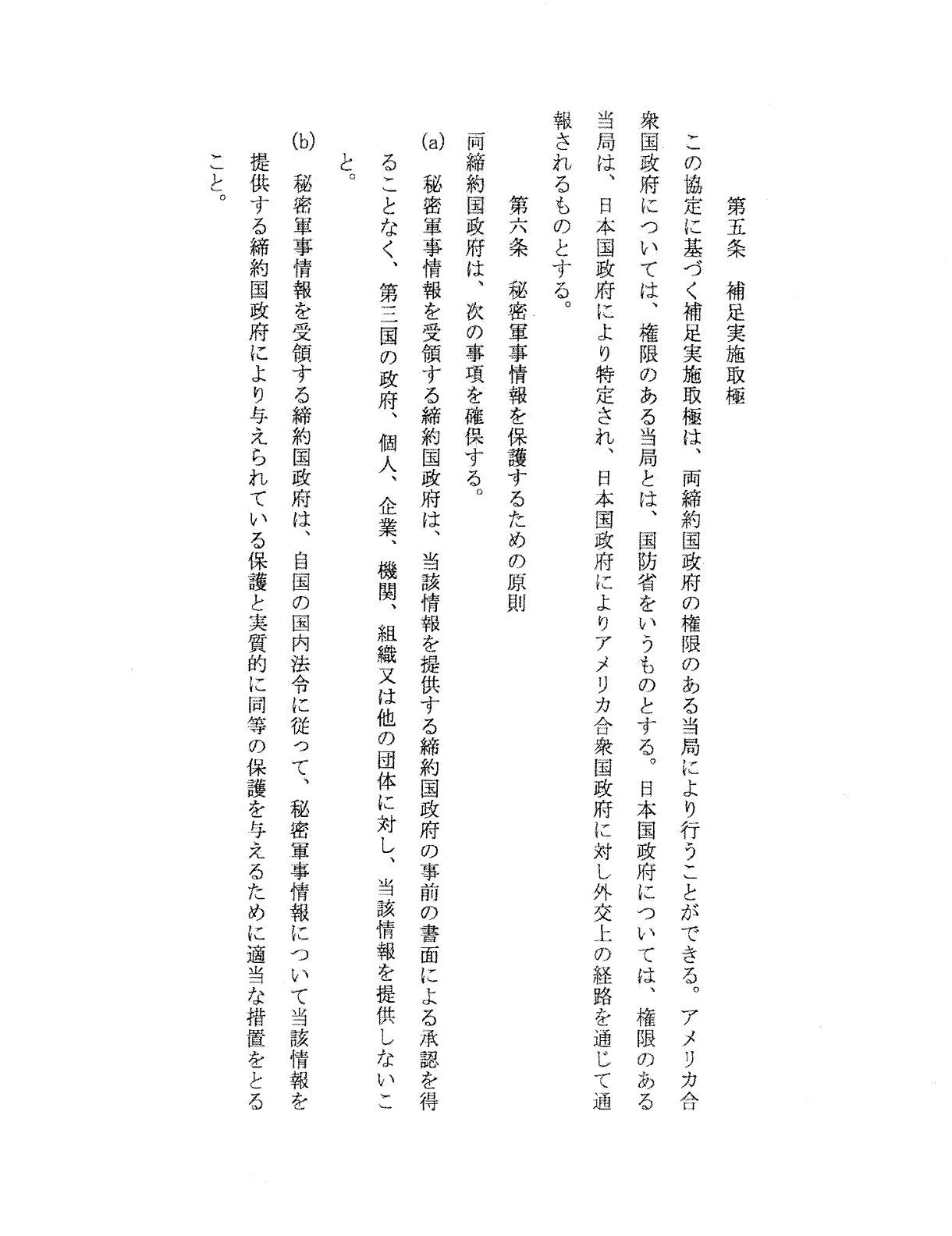
5
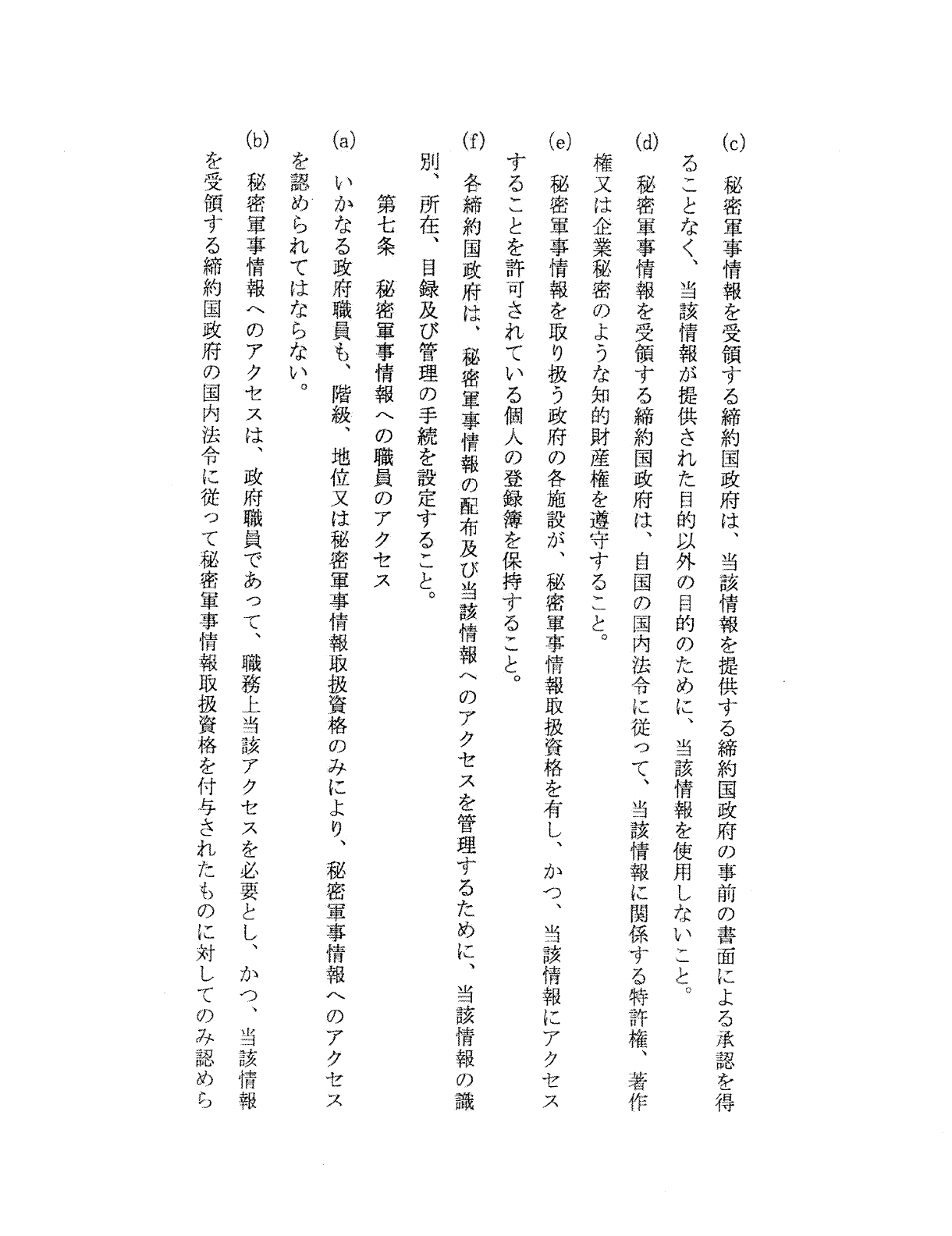
6
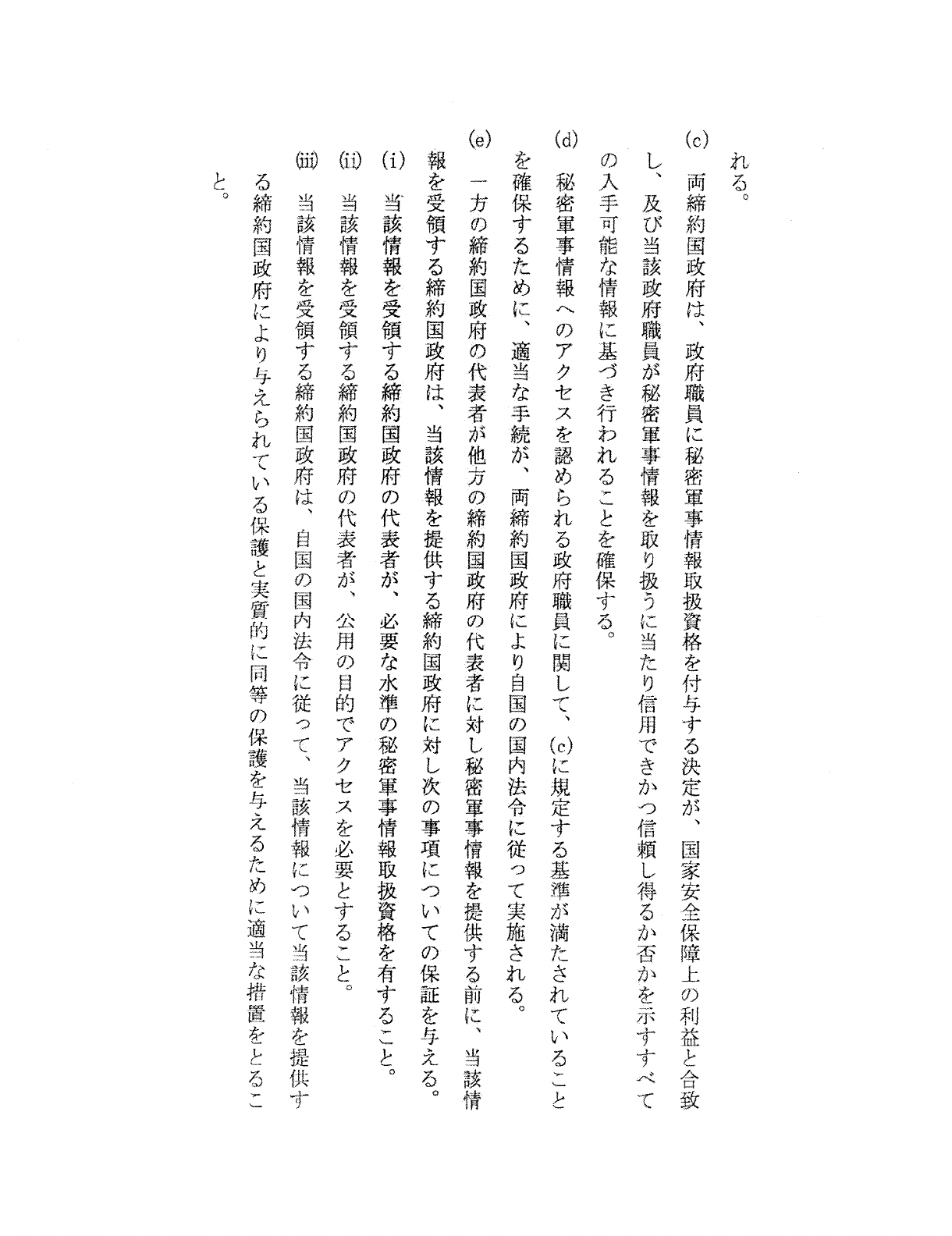
7
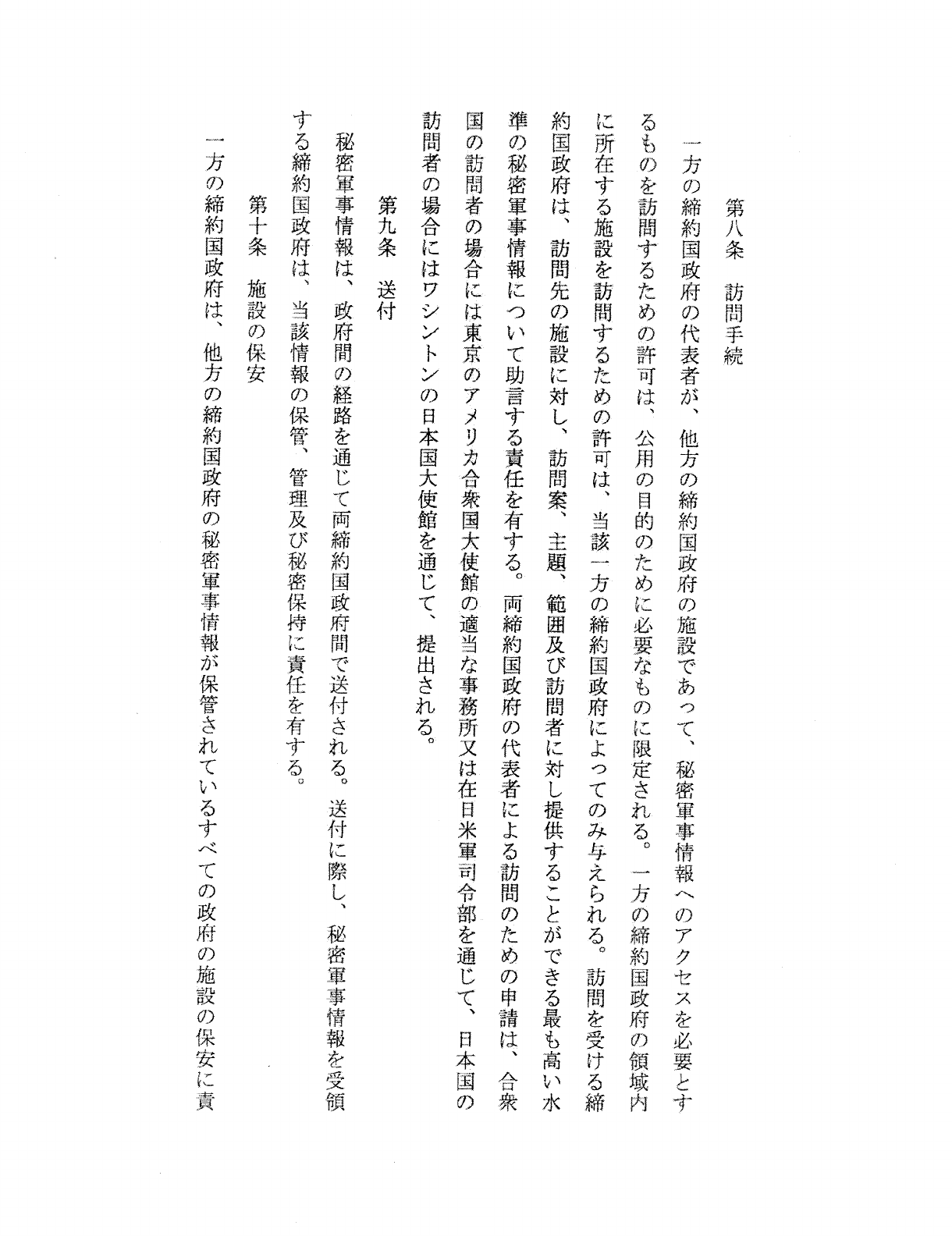
8
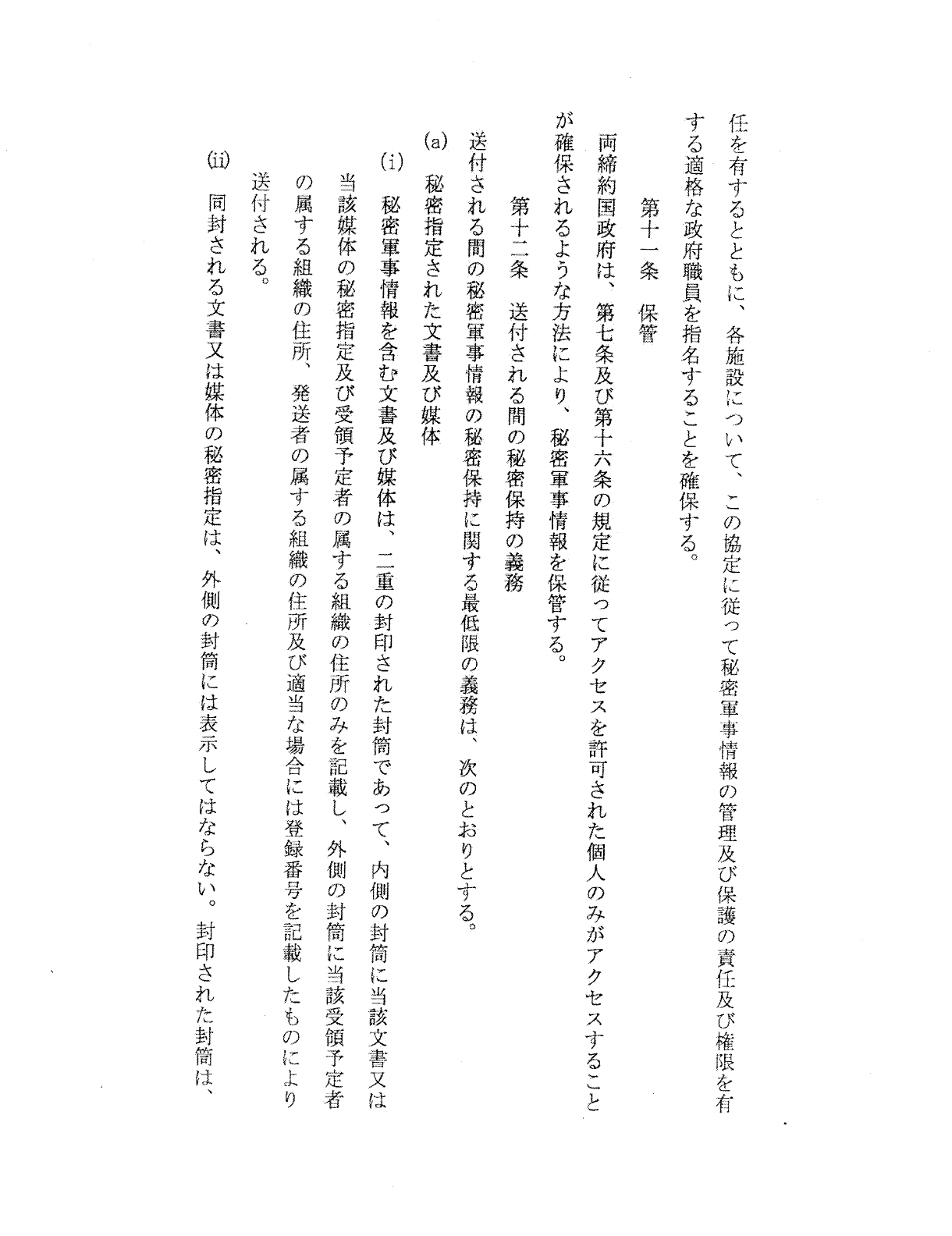
9
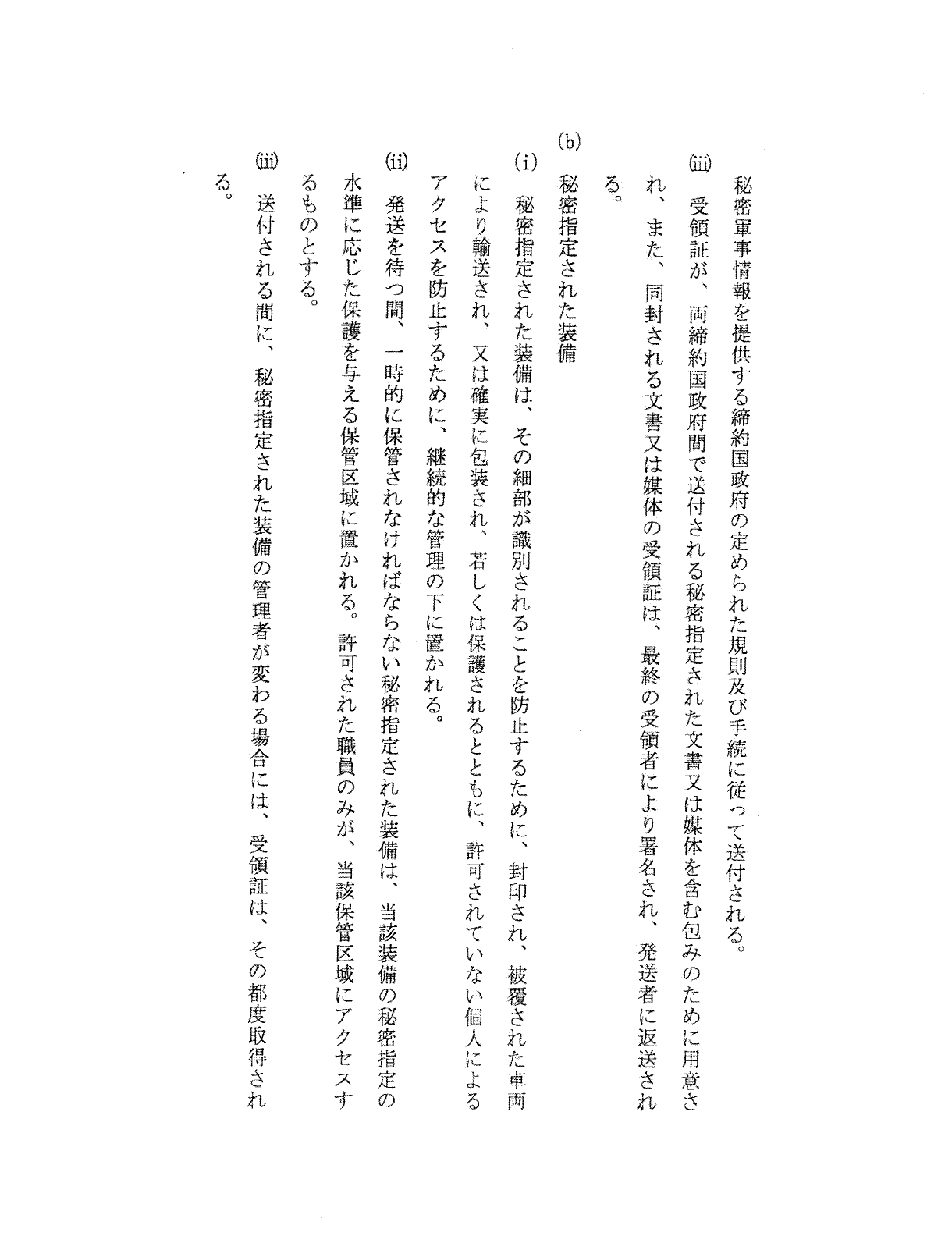
10
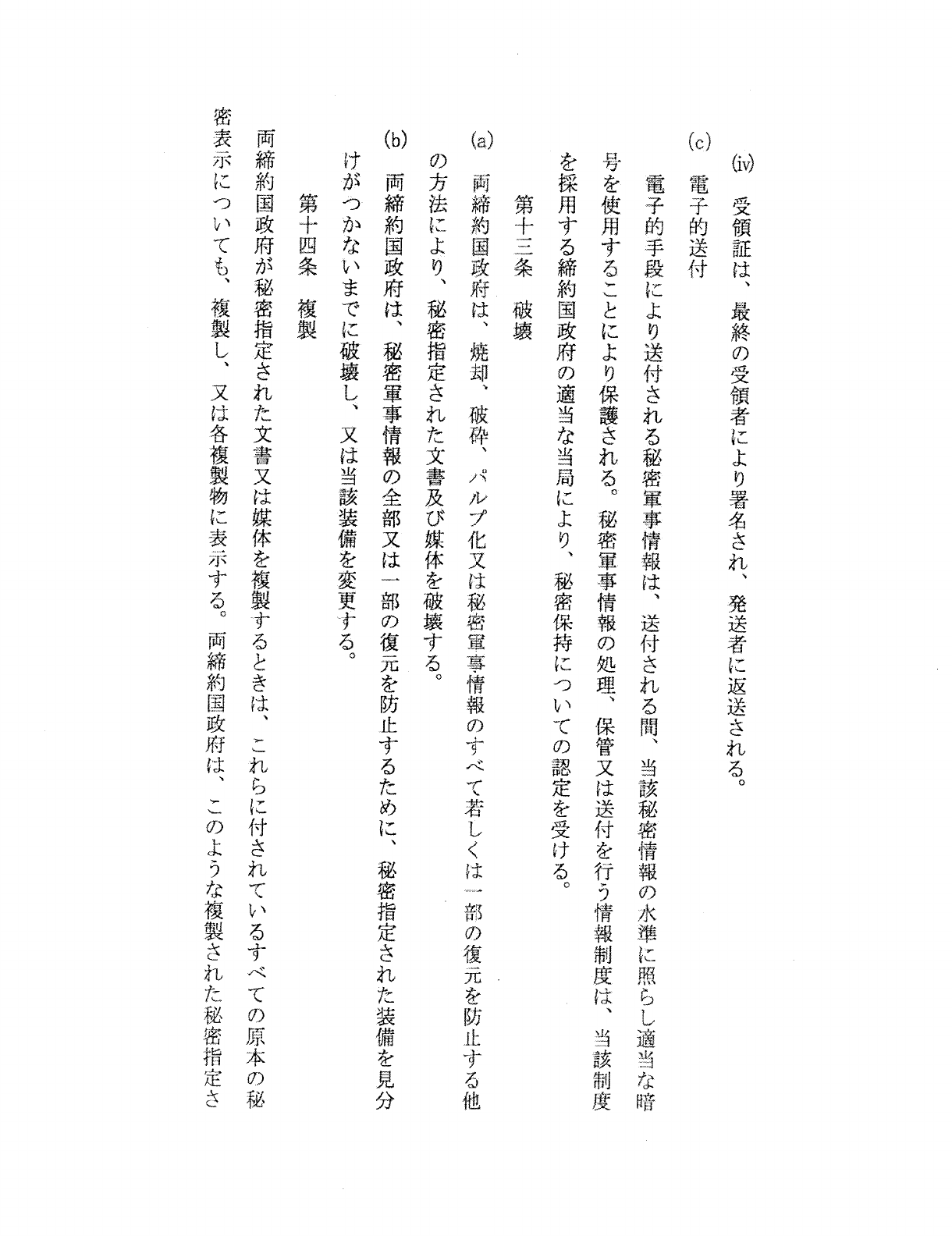
11
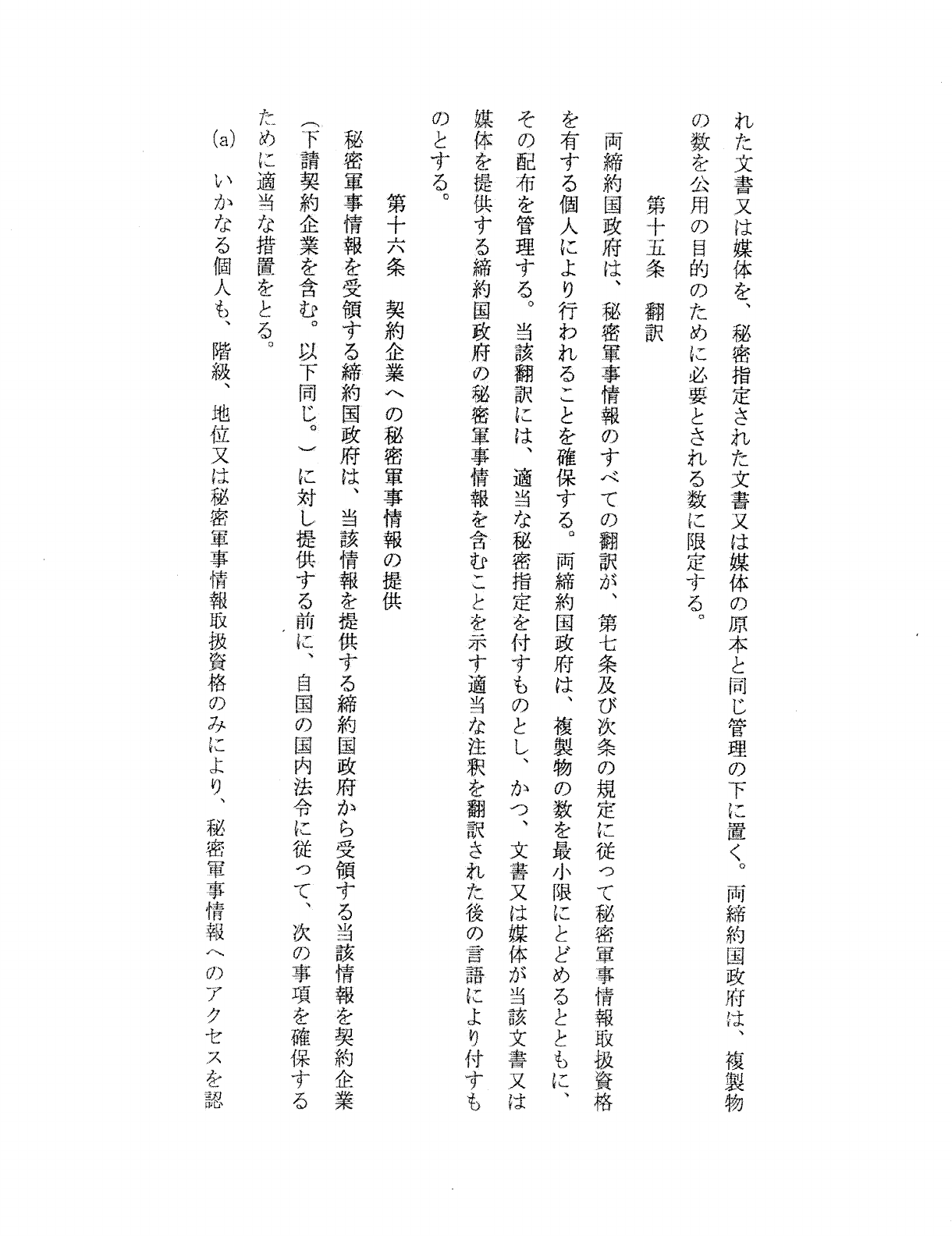
12
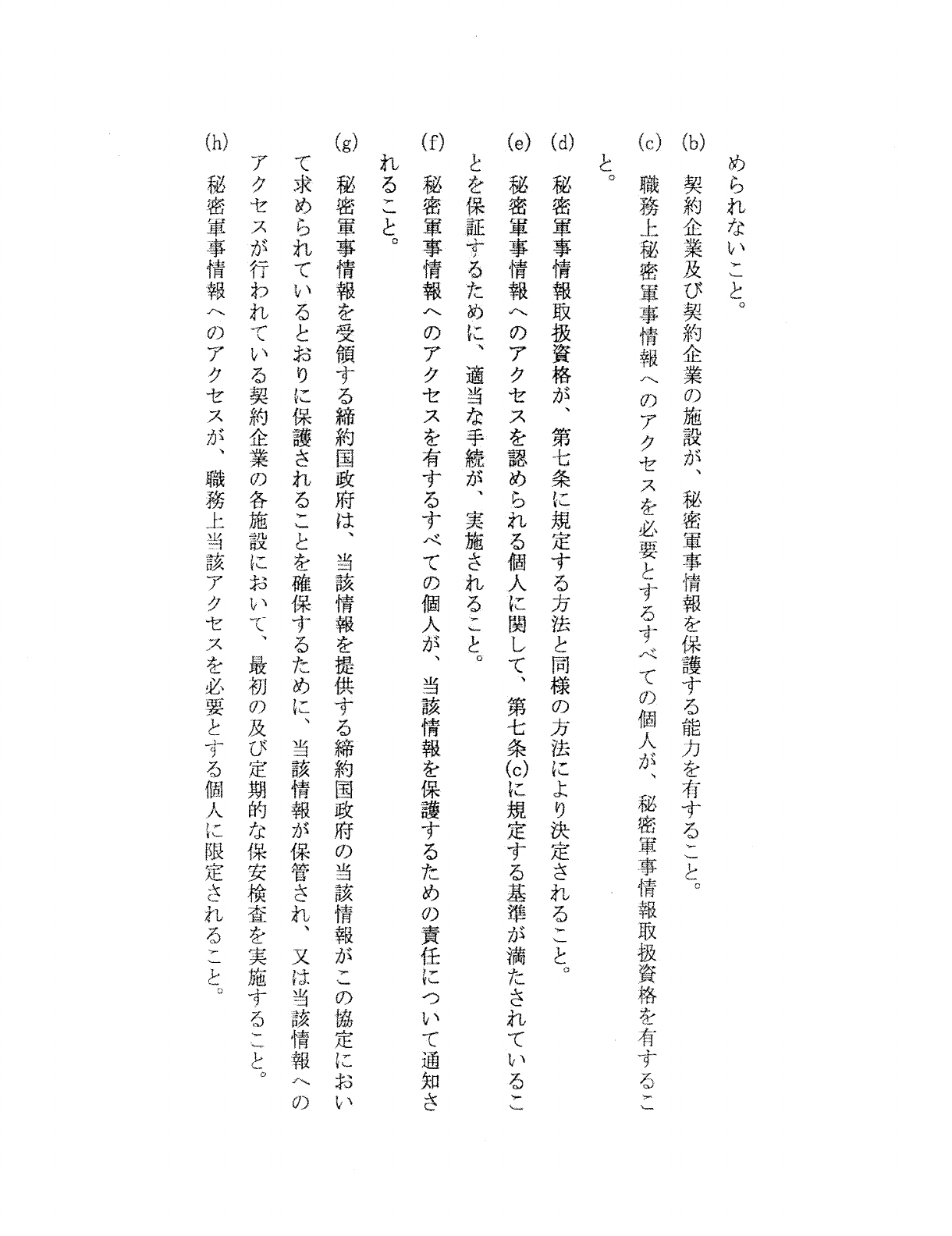
13
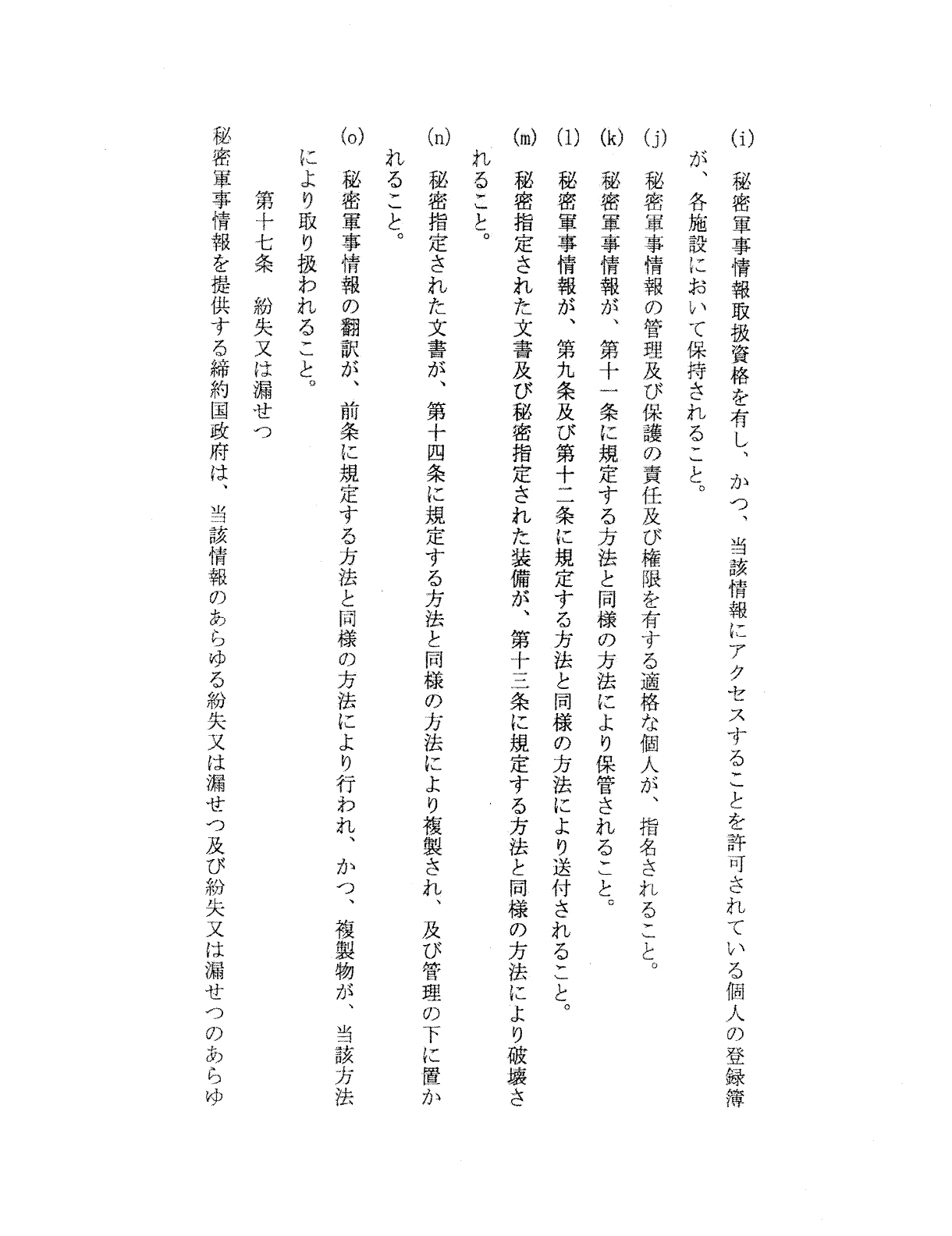
14
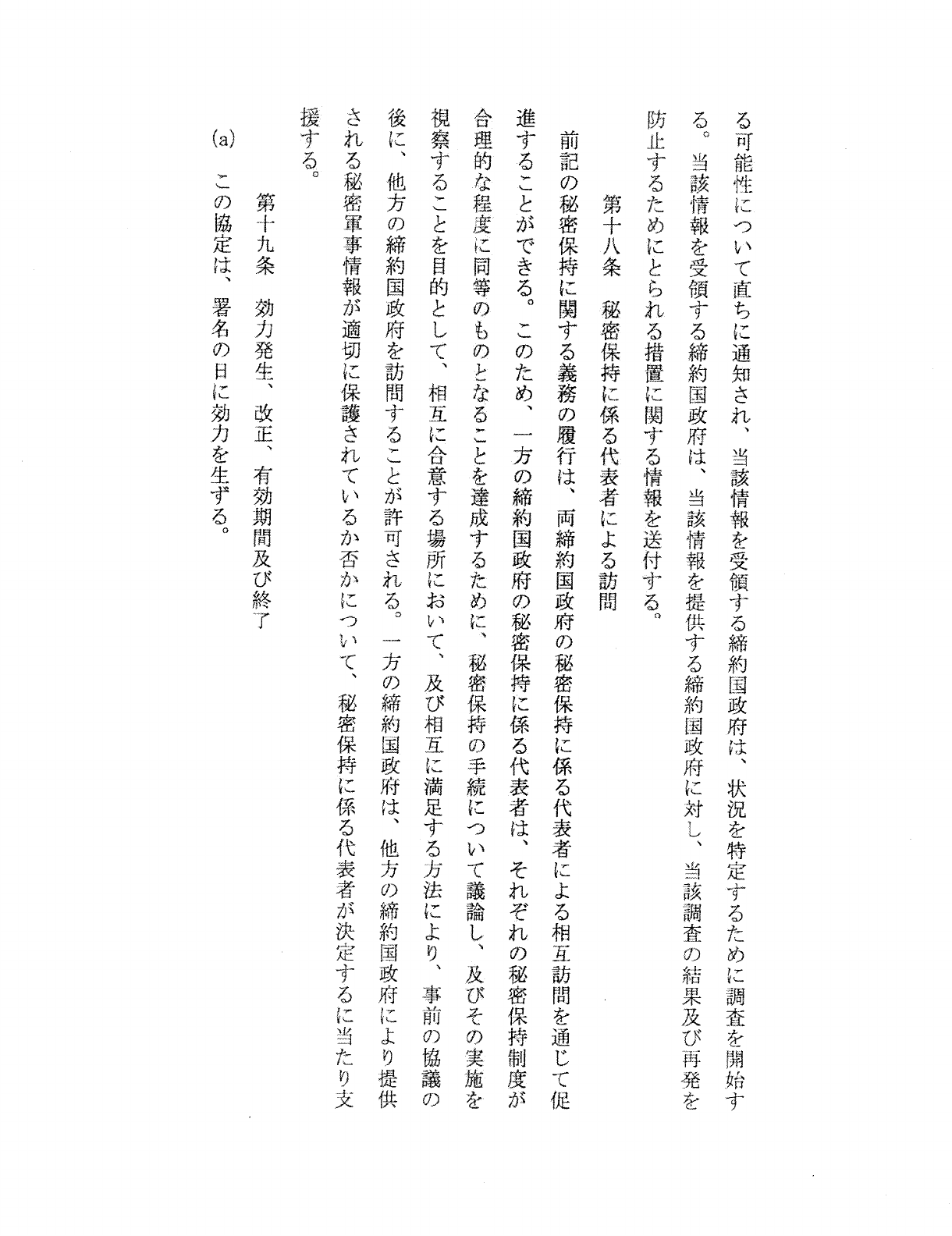
15
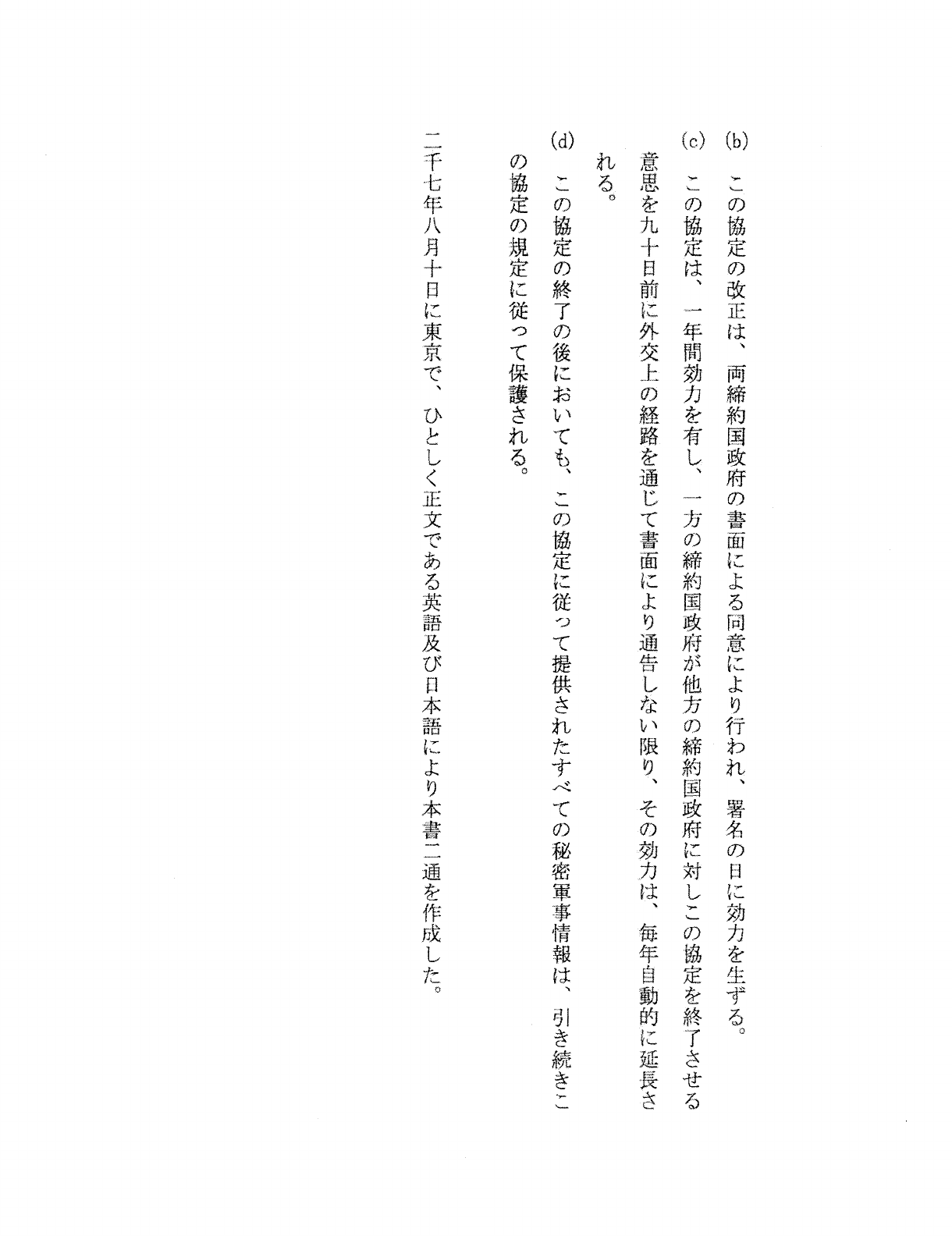
16
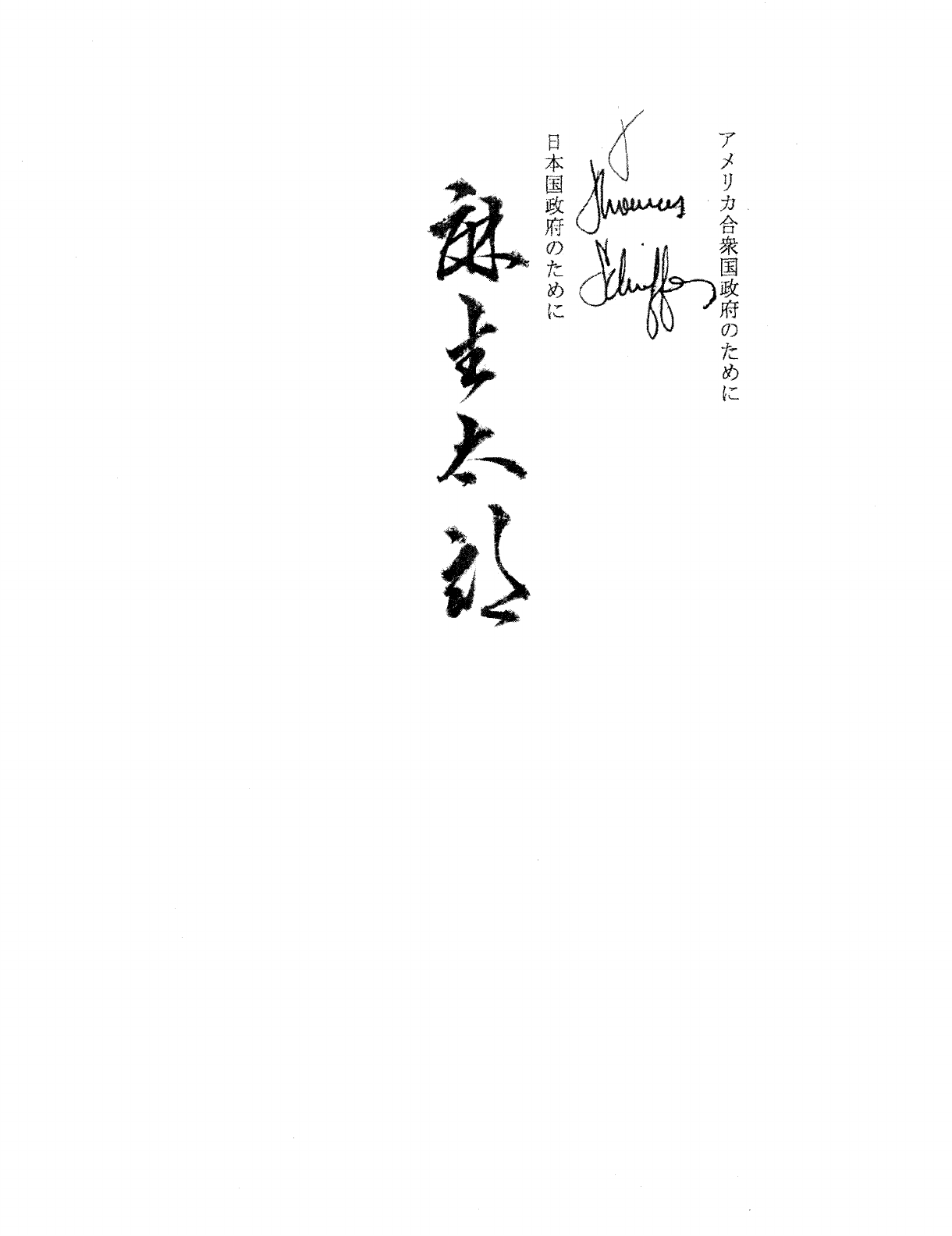
17
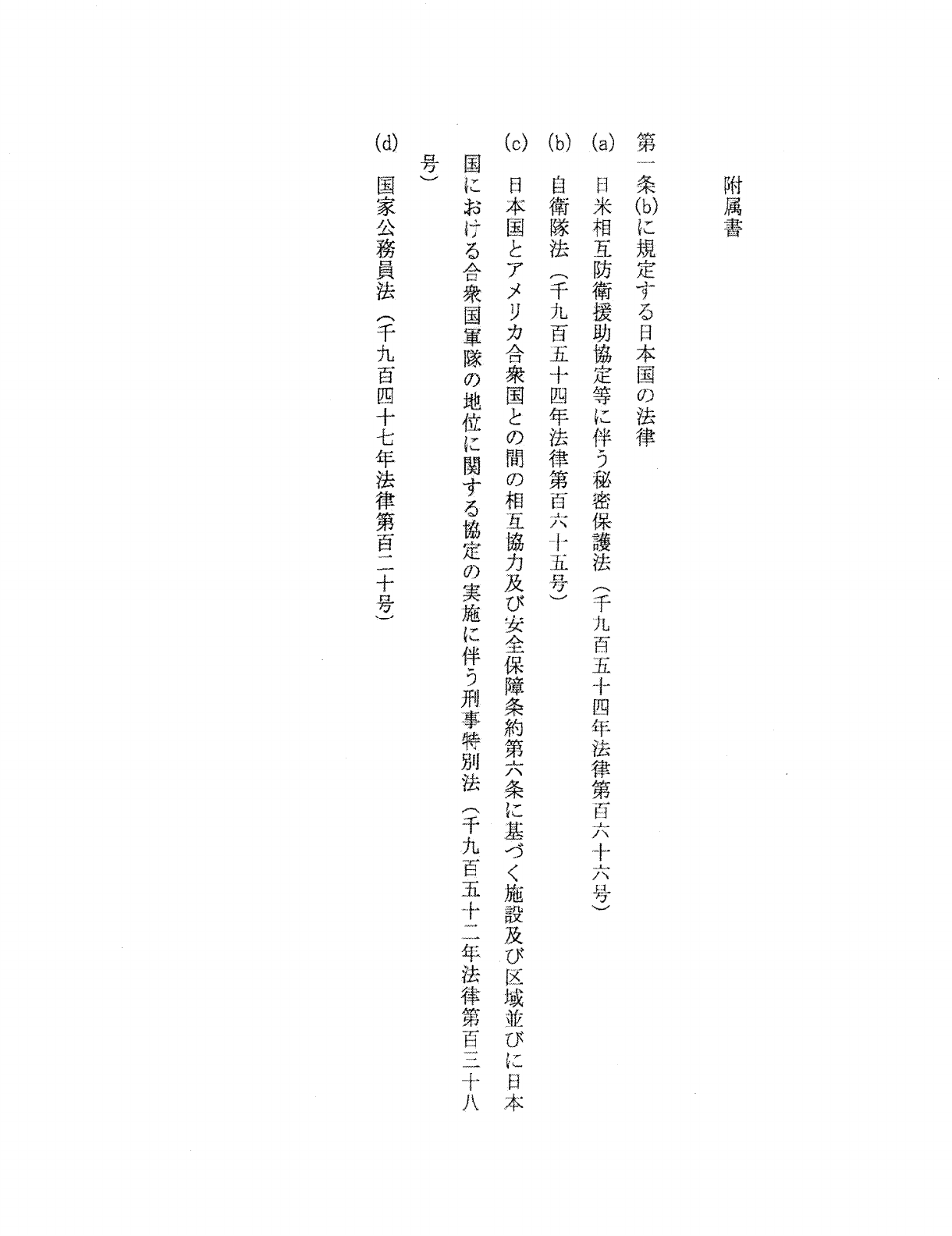
18
